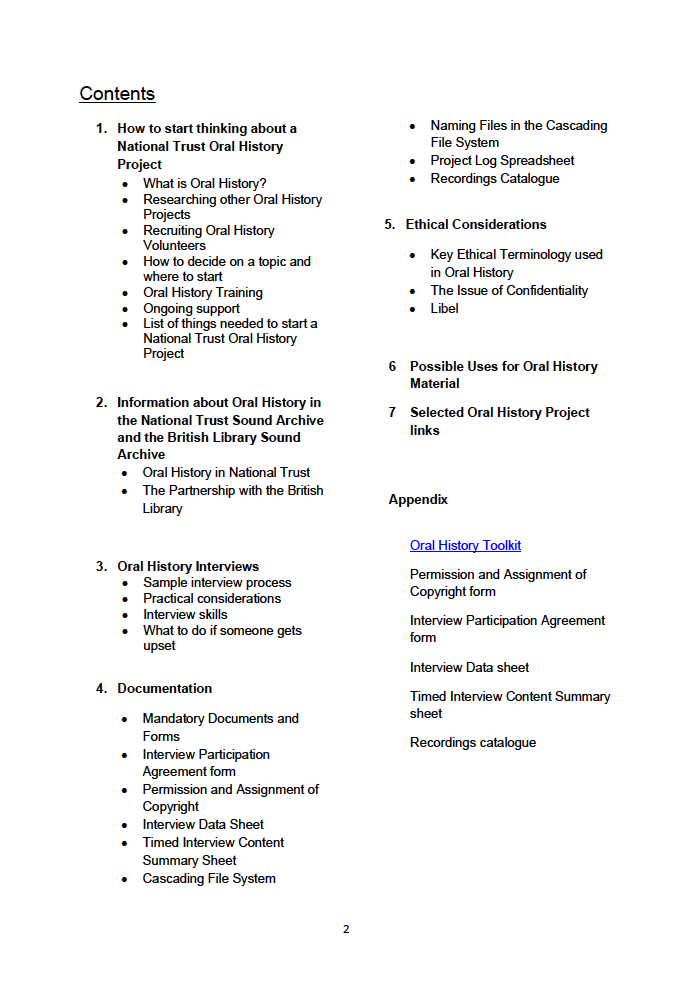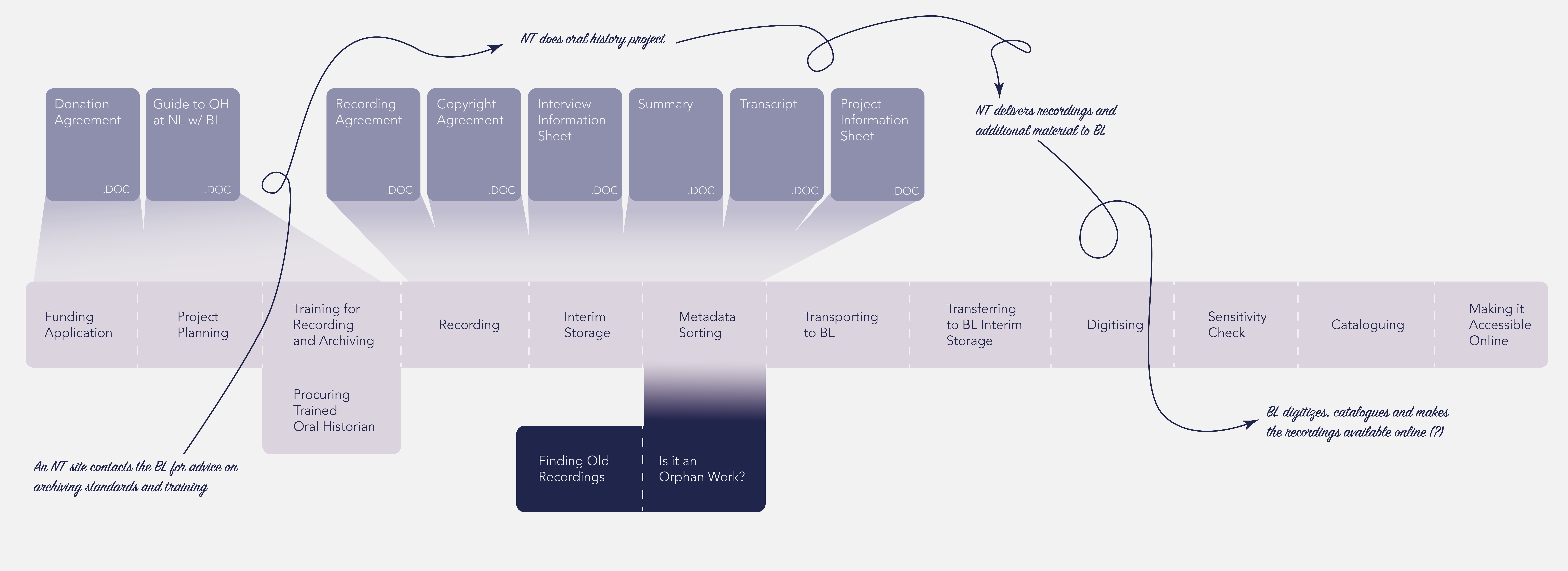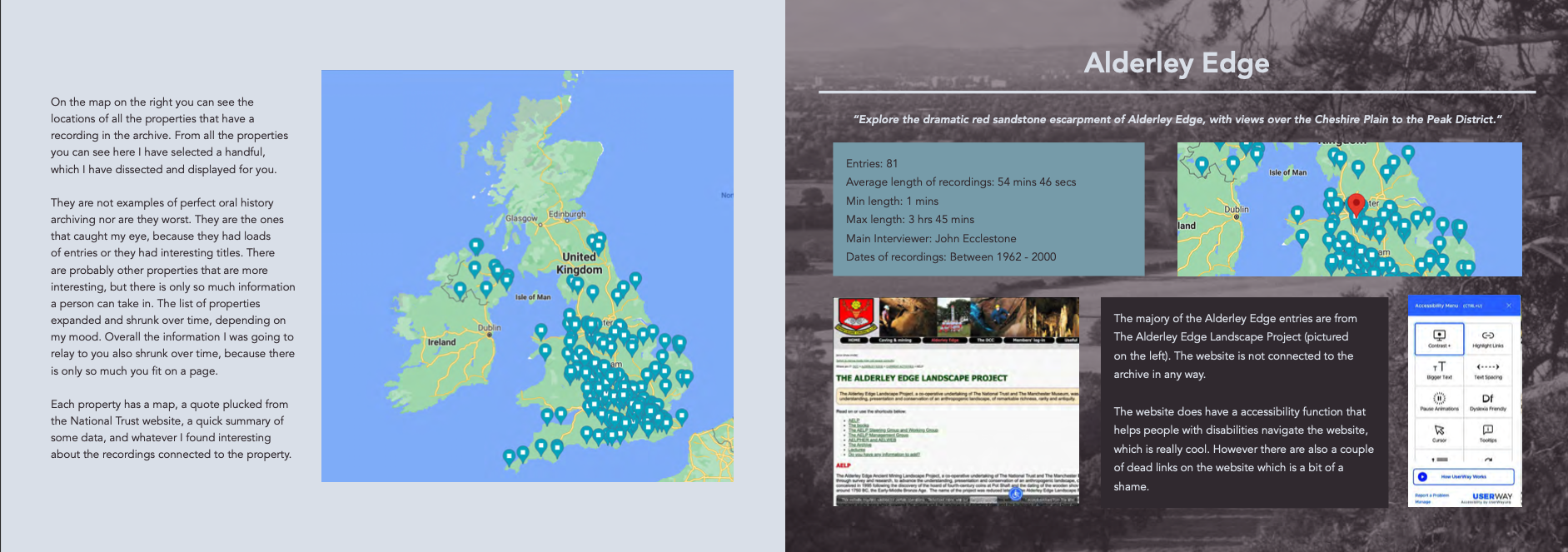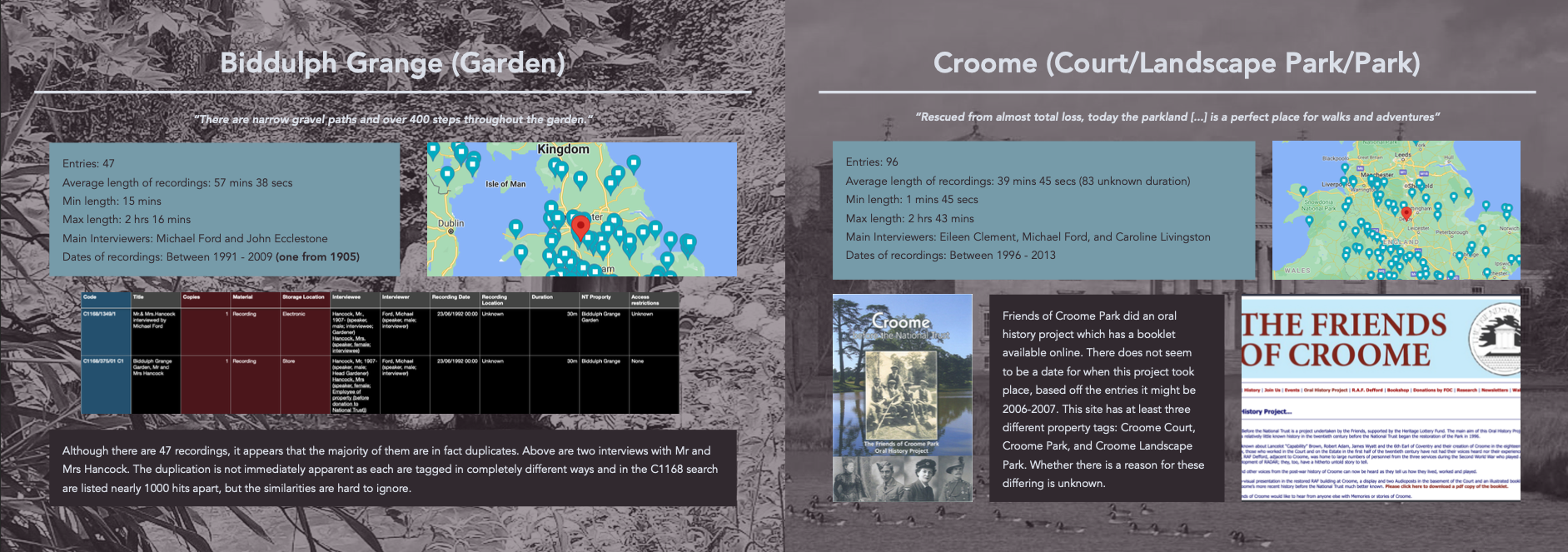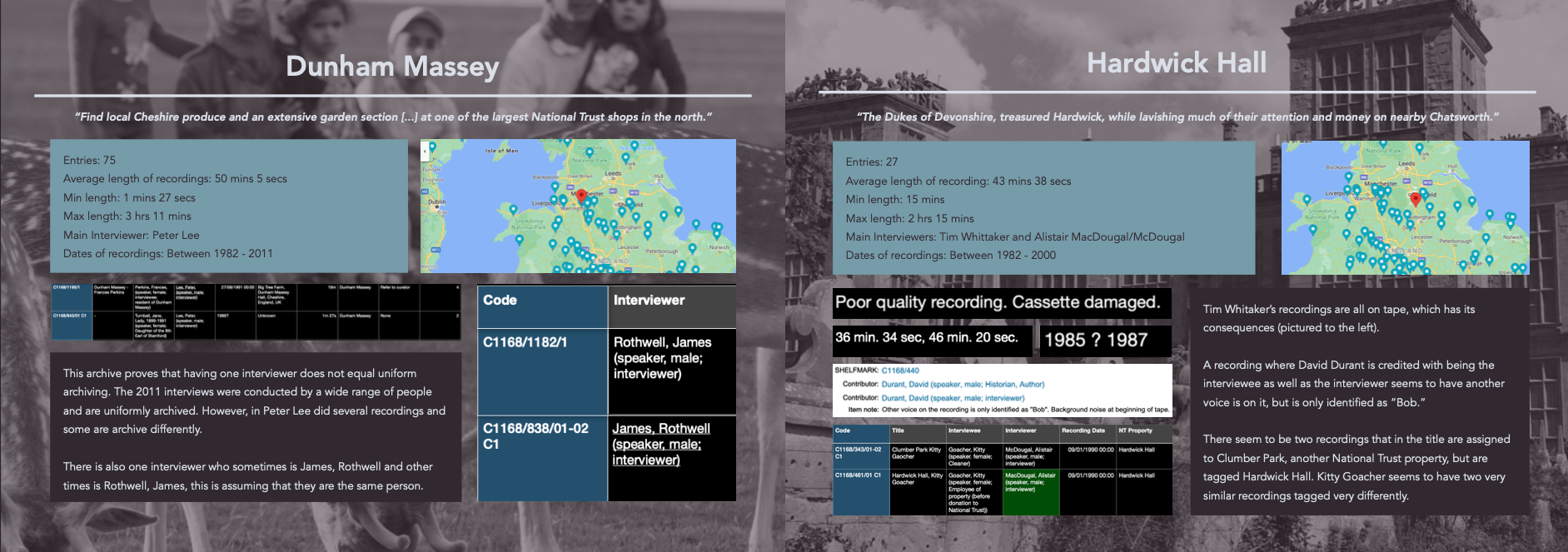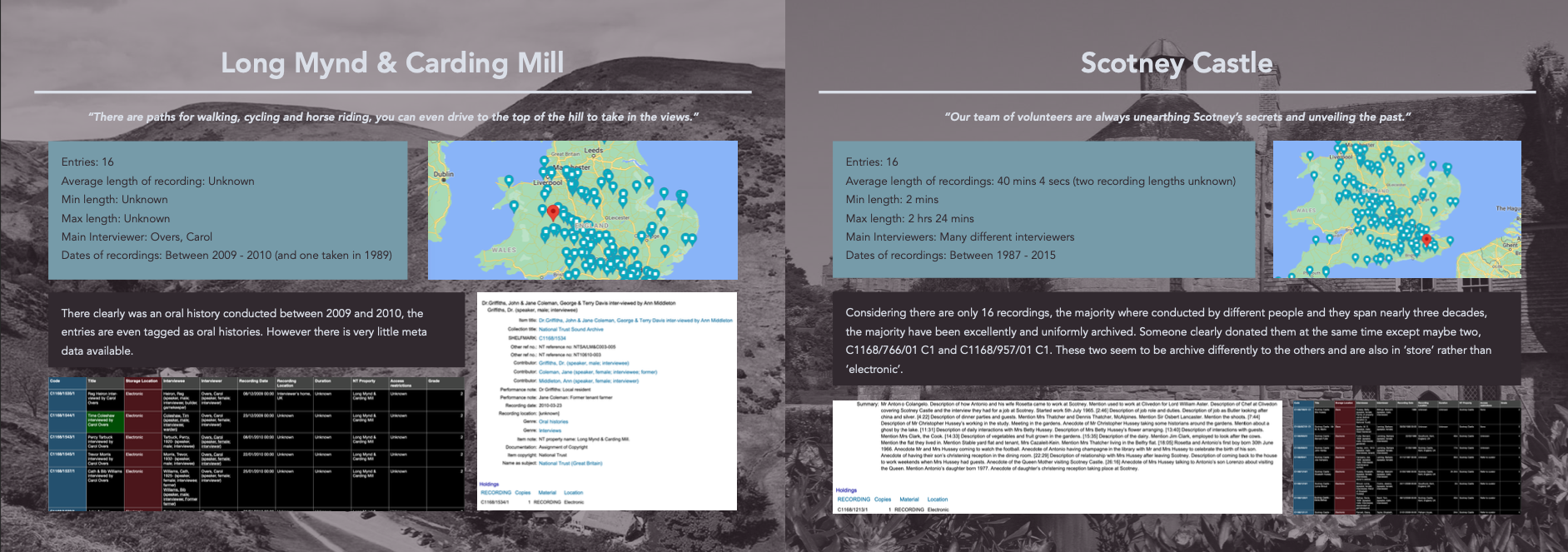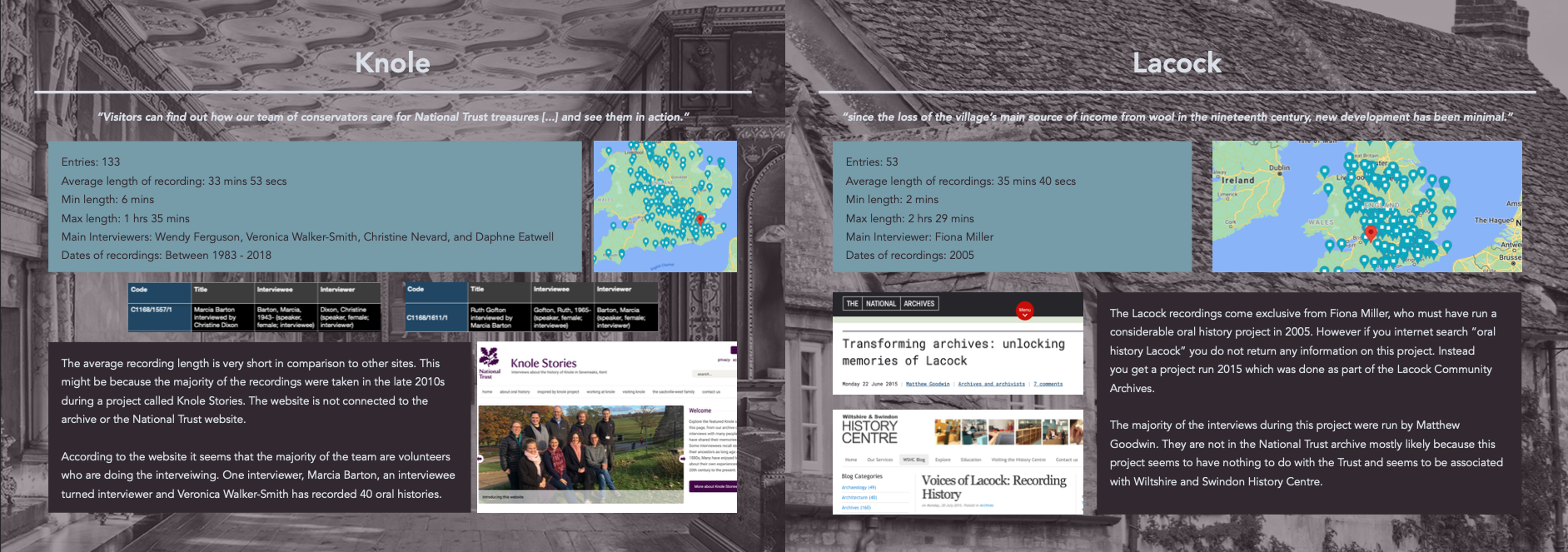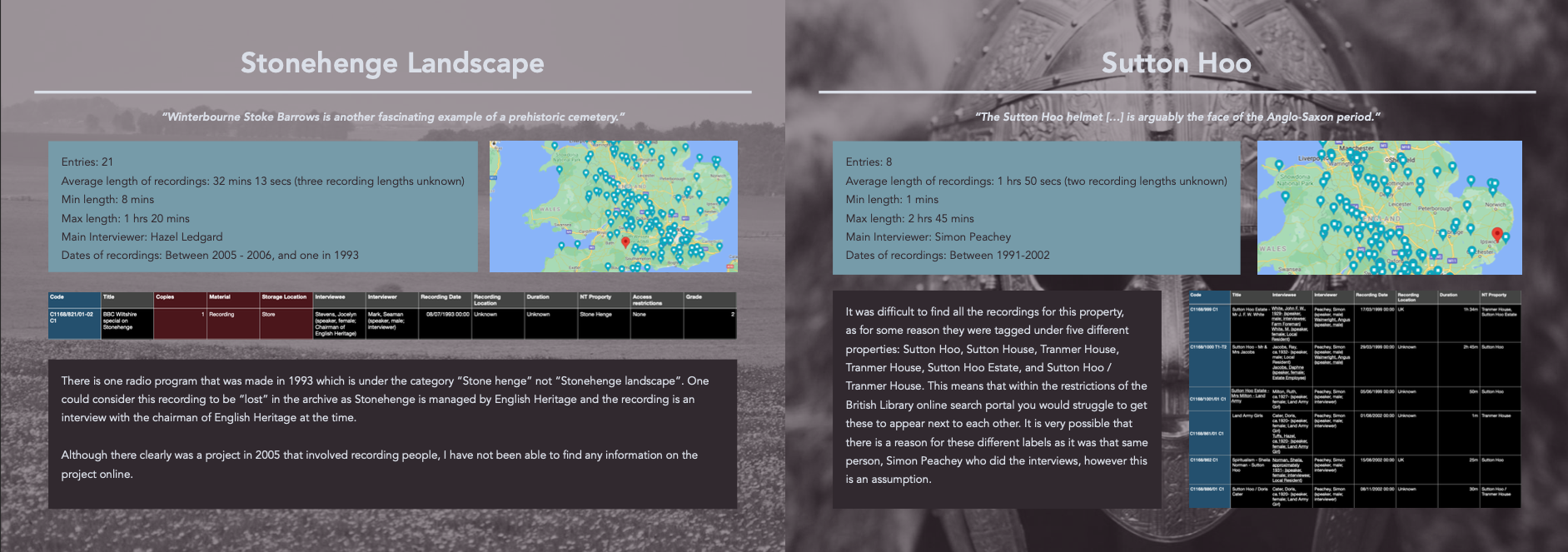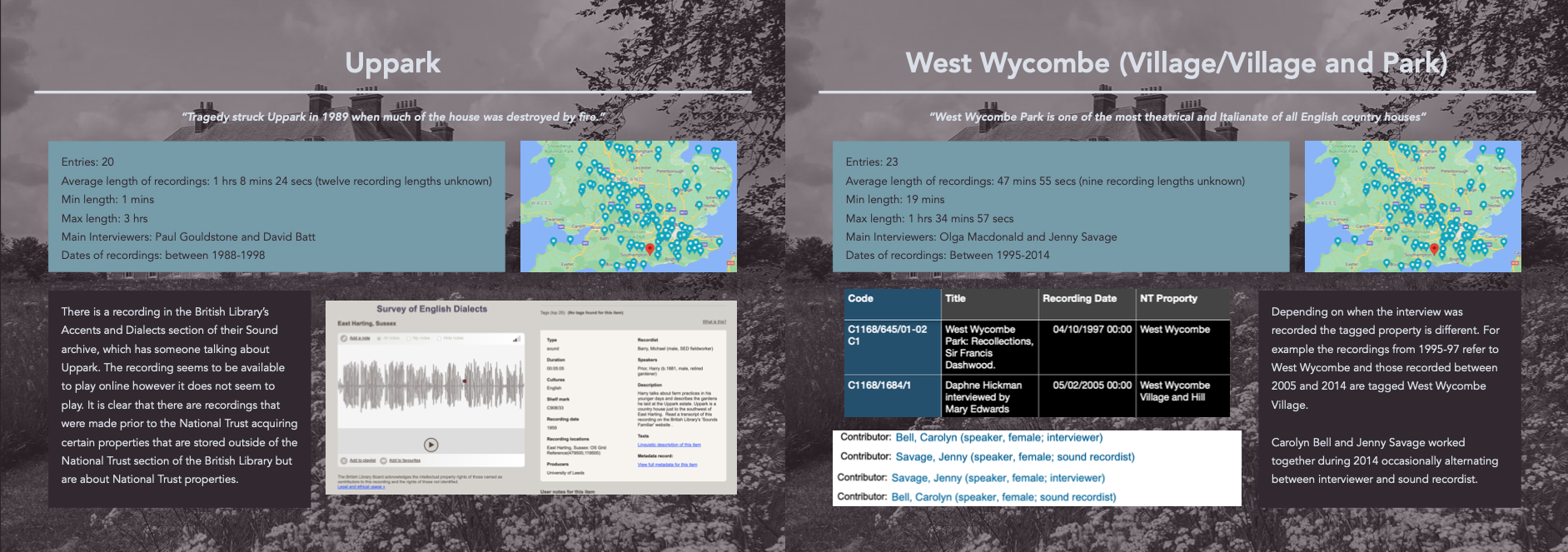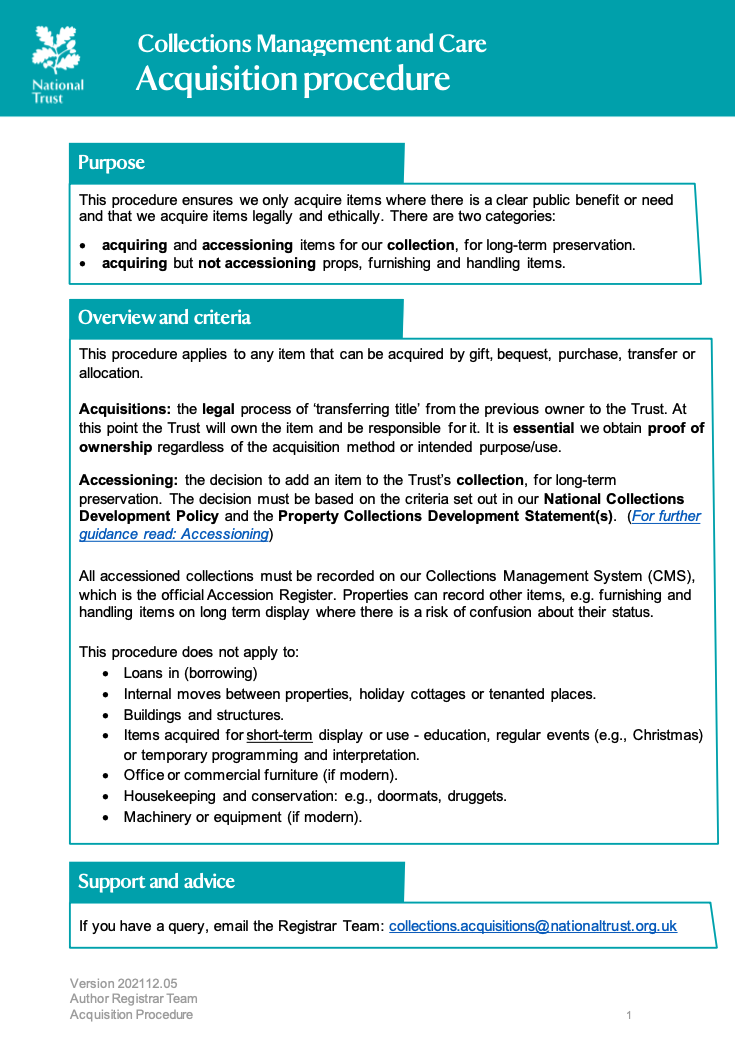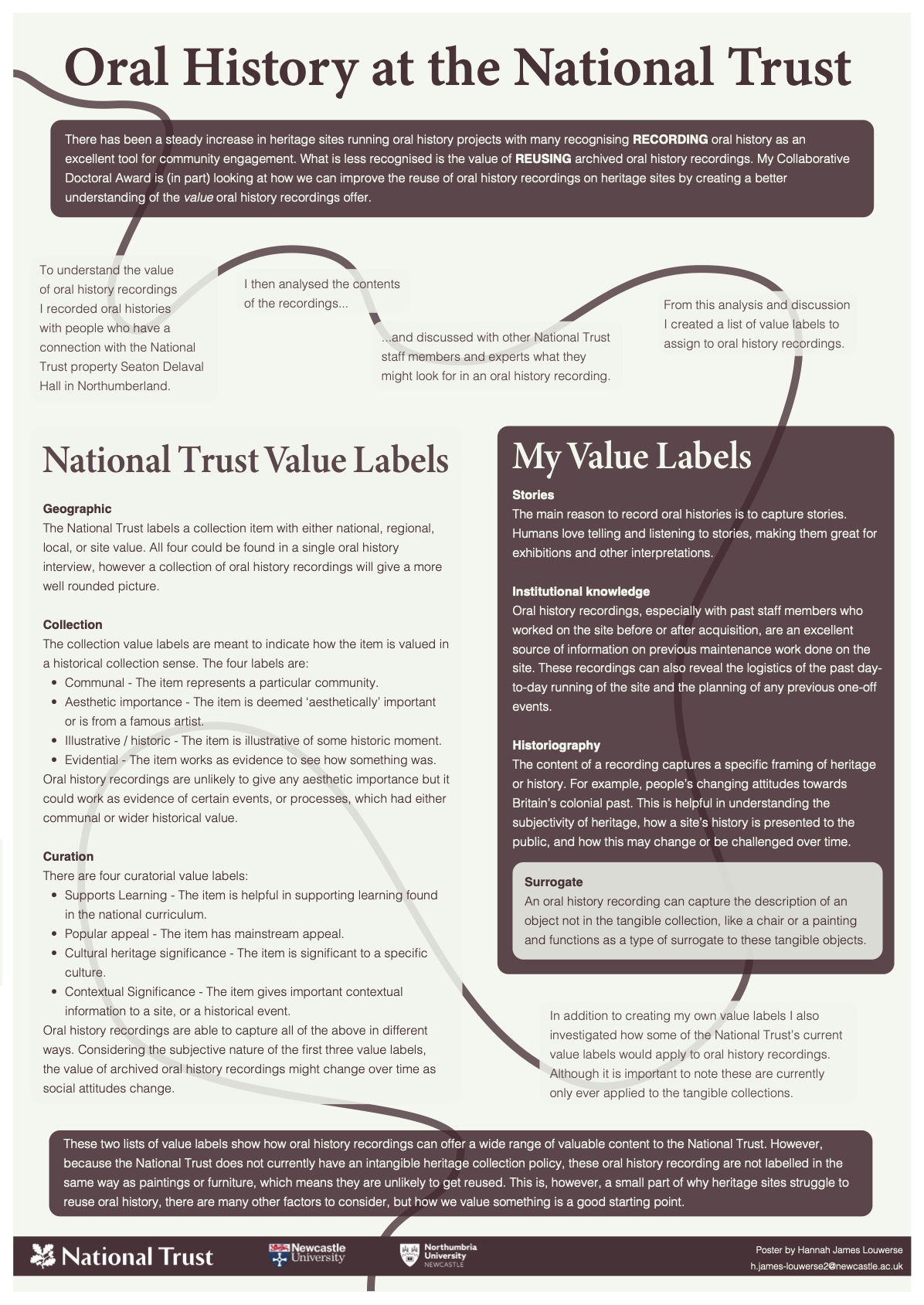nt. 001 There is no stable presence of oral history at the National Trust. The Trust’s relationship with oral history has been inconsistent, shaped by individuals over the past few decades who have taken a particular interest in it. I observed this fragmentation across three aspects of the Trust: the oral history advice, the staff’s attitude, and the archive of oral history. In this section I will go through each aspect and then explain how these observations, in combination with my experience recording oral history at Seaton Delaval Hall, created two outputs: a guide and a report.
If you type oral history into Acorn [the National Trust's information sharing website] you get “the guide to setting up an oral history project.” Although sadly many of the links to other Trust oral history projects are dead-links, the guide gives a good foundation to recording oral history. The emphasis of working with The British Library and getting training from the Oral History Society which can be paid for by the Sir Laurie Magnus Bursary is great. I have come across many oral history projects where archiving is very much treated as an afterthought, so it is refreshing to see how the guide encourages working with an archivist throughout an oral history project. However, both the guide and the current permissions and copyright assignment form, which is to be used for archiving the recordings at the British Library, are not completely up to date with regards to data protection and the copyright assignment. There is little to no mention of GDPR and the copyright assignment looks a little too simple if compared to what copyright, data protection and licensing experts Naomi Corn Associates currently advise.
It is also important to point out that in the guide there is no mention of the ethical issues you need to consider when recording oral history, only a small paragraph on what to do in case the interviewee gets upset. Because I am recording oral histories via Newcastle University I had to go through thorough ethical approval. There is no such process within the National Trust.
OHD_WRT_0177 My experience of oral history at the National Trust 27/10/22
nt. 002 Below is a flowchart I made during my placement at the British Library. As this was my last placement, I had already gained experience and knowledge from the previous two.1 The flowchart depicts the various stages of making an oral history accessible within the context of the Trust and the British Library. When compared to the Trust’s internal oral history guide, it reveals gaps in the guide, such as interim storage, sensitivity checks, or what steps to follow if an old recording is found.2 Clear up-to-date information on oral history processes, including the handling of oral history recordings and associated materials, is not currently available to Trust staff and volunteers. I communicated these discrepancies in a summary of my experience recording oral history for Seaton Delaval Hall to the national lead of oral history at the Trust and the head of collections management.3
Oral history flowchart NT to BL – OHD_GRP_0275
nt. 003 The staff’s attitude toward oral history became clear to me during a workshop at the National Trust Northern Collections and Interiors Forum in York, which my Trust supervisor Jo Moody invited me to lead.4 The aim was to have an open discussion about oral history and gauge the collection staff’s understanding of oral history. The participants had various degrees of familiarity with oral history, but once we started discussing the ins and outs of conserving and maintaining it, they had more questions than answers.
Activity One: Oral History Braindump
Aim: To understand the value of oral history to heritage sites.
Task: To start with, the participants will be asked to “dump” all the times they have listened to an oral history, whether good or bad. They will then pick out the positive or negative feelings they had while experiencing these oral histories, in an effort to understand the value of listening to oral history.
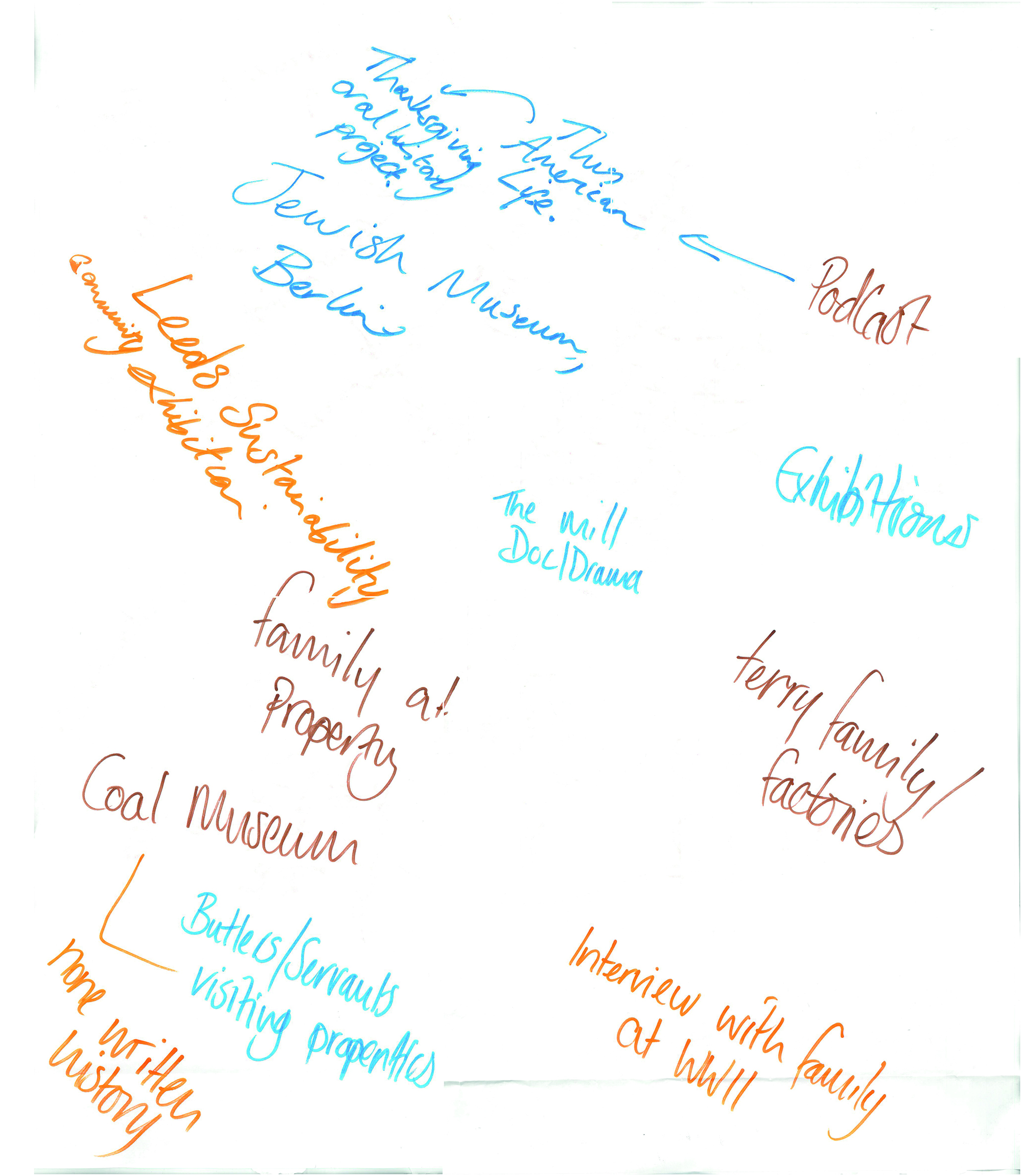
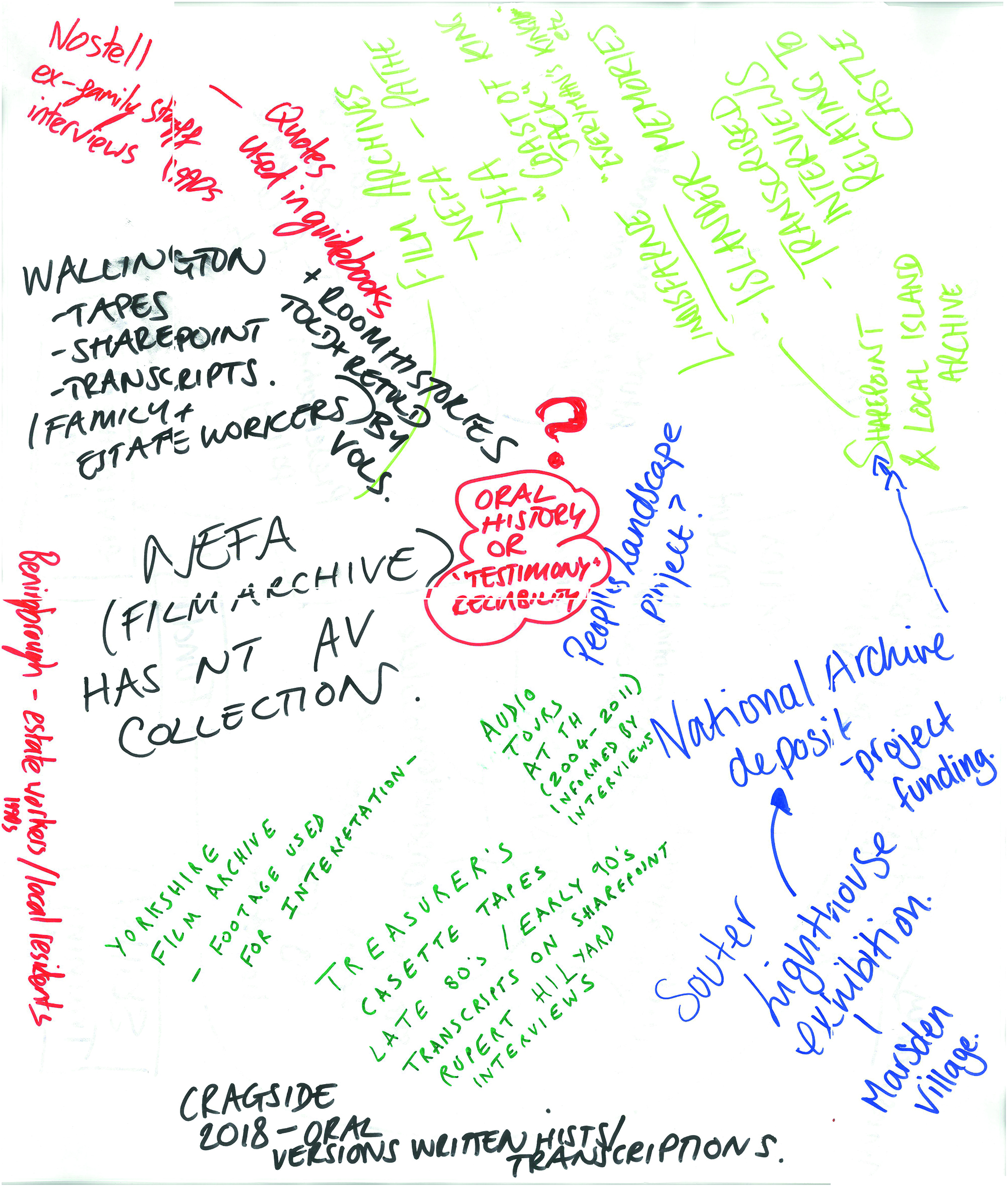
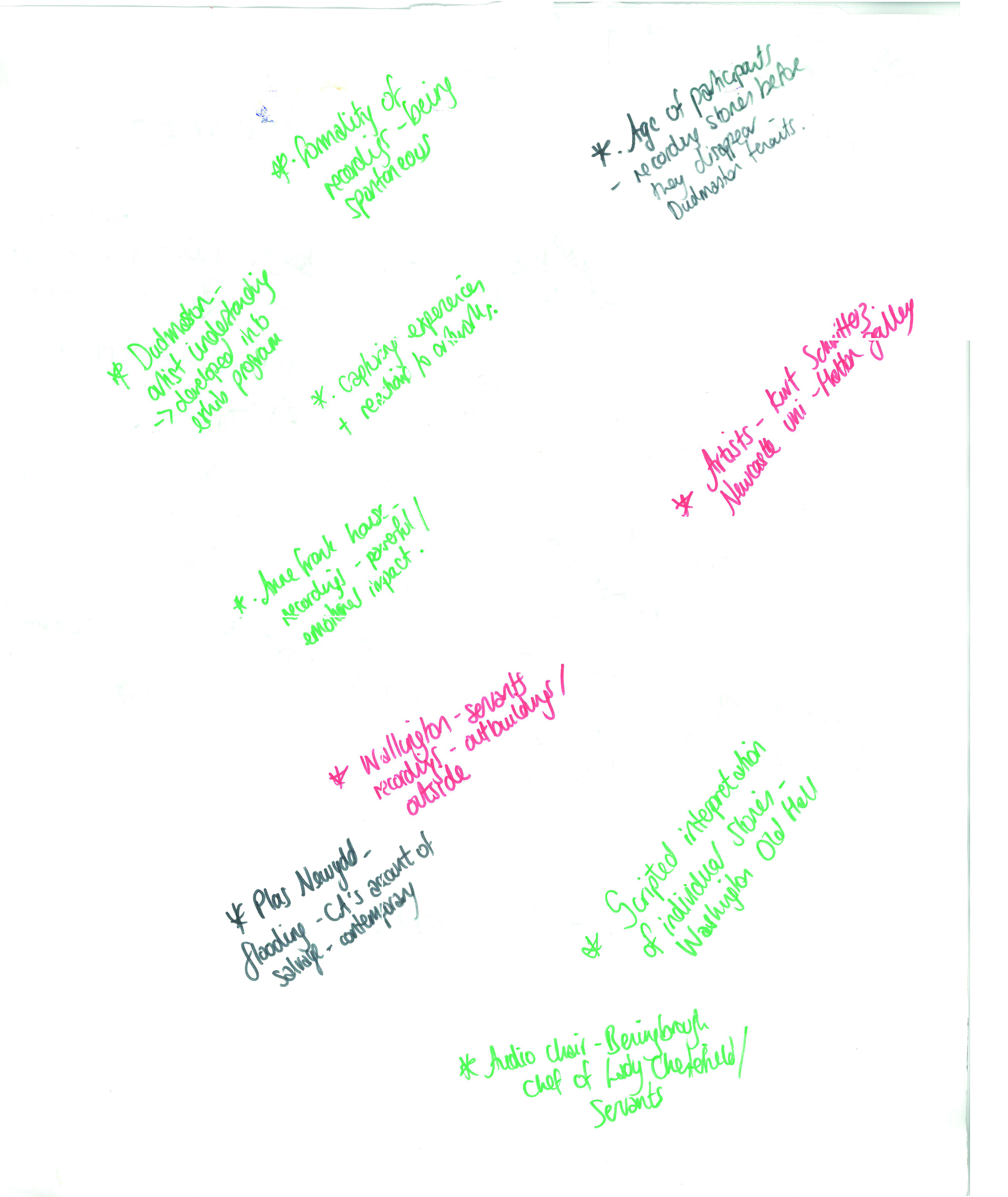
Activity two: Breaking down an oral history recording
Aim: To understand what we need to do to make and keep an oral history recording.
Task: First, the participants will be asked to think about is needed to make an oral history recording. Then they will be asked what is necessary to keep an oral history recording.
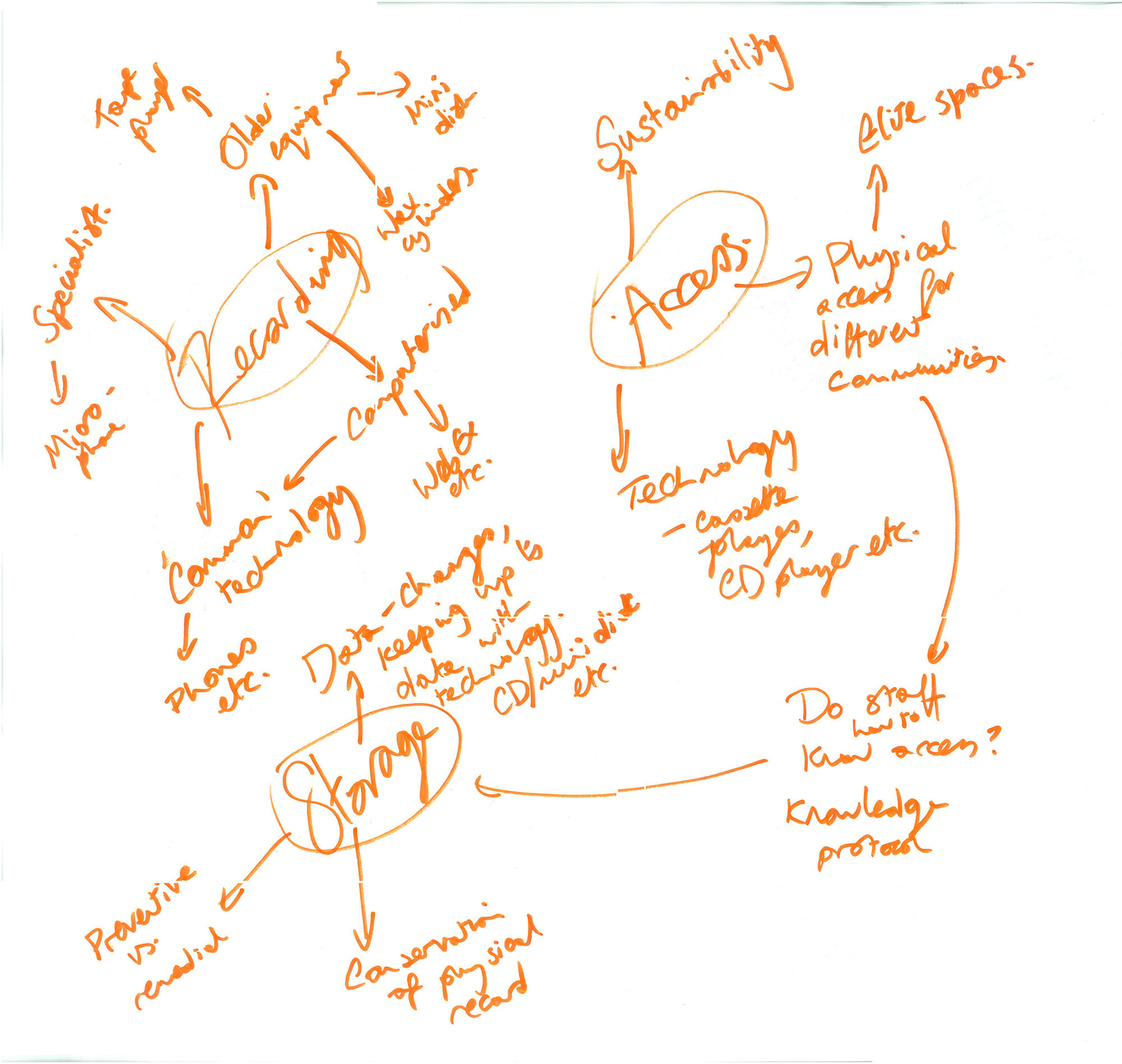
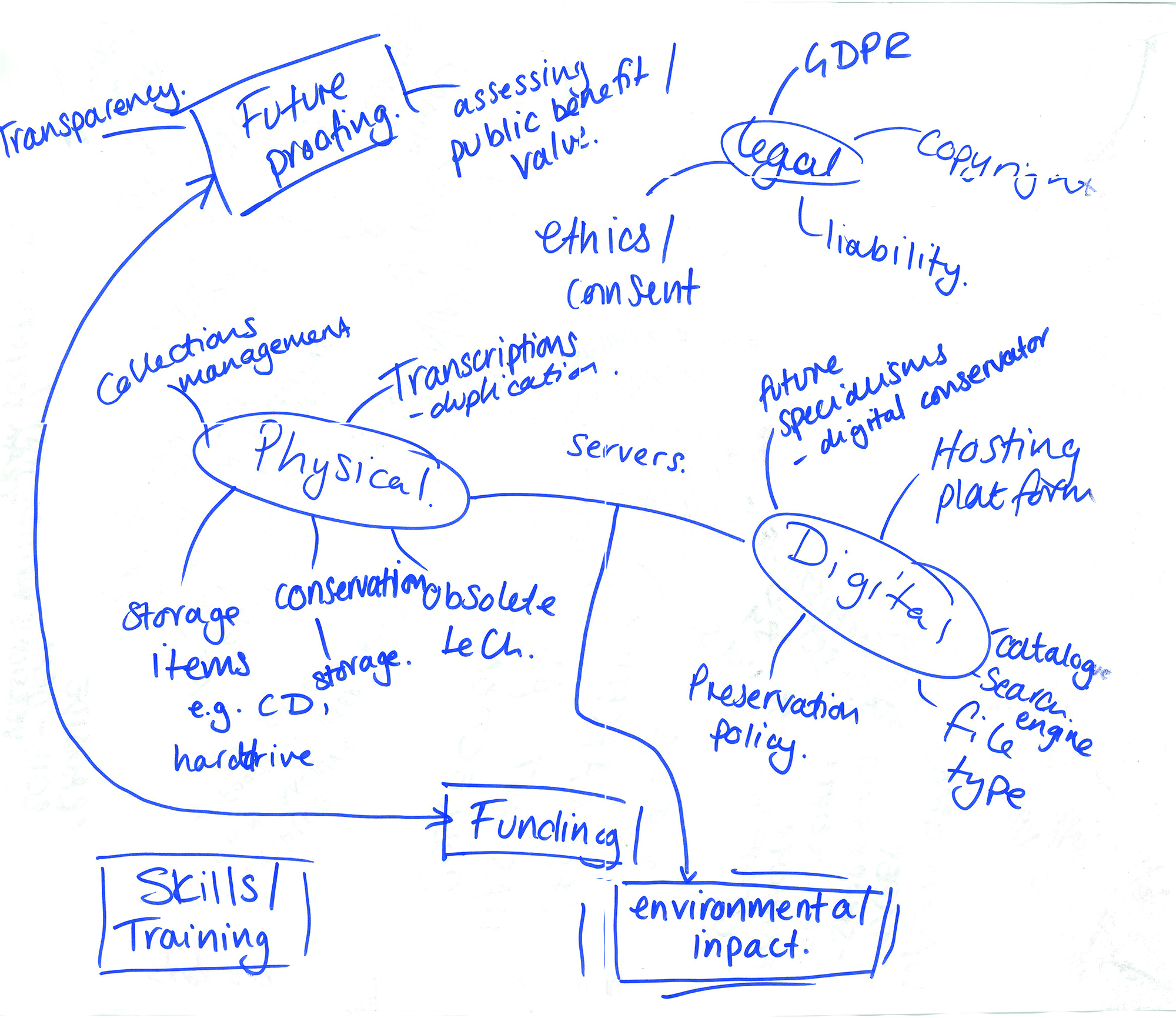
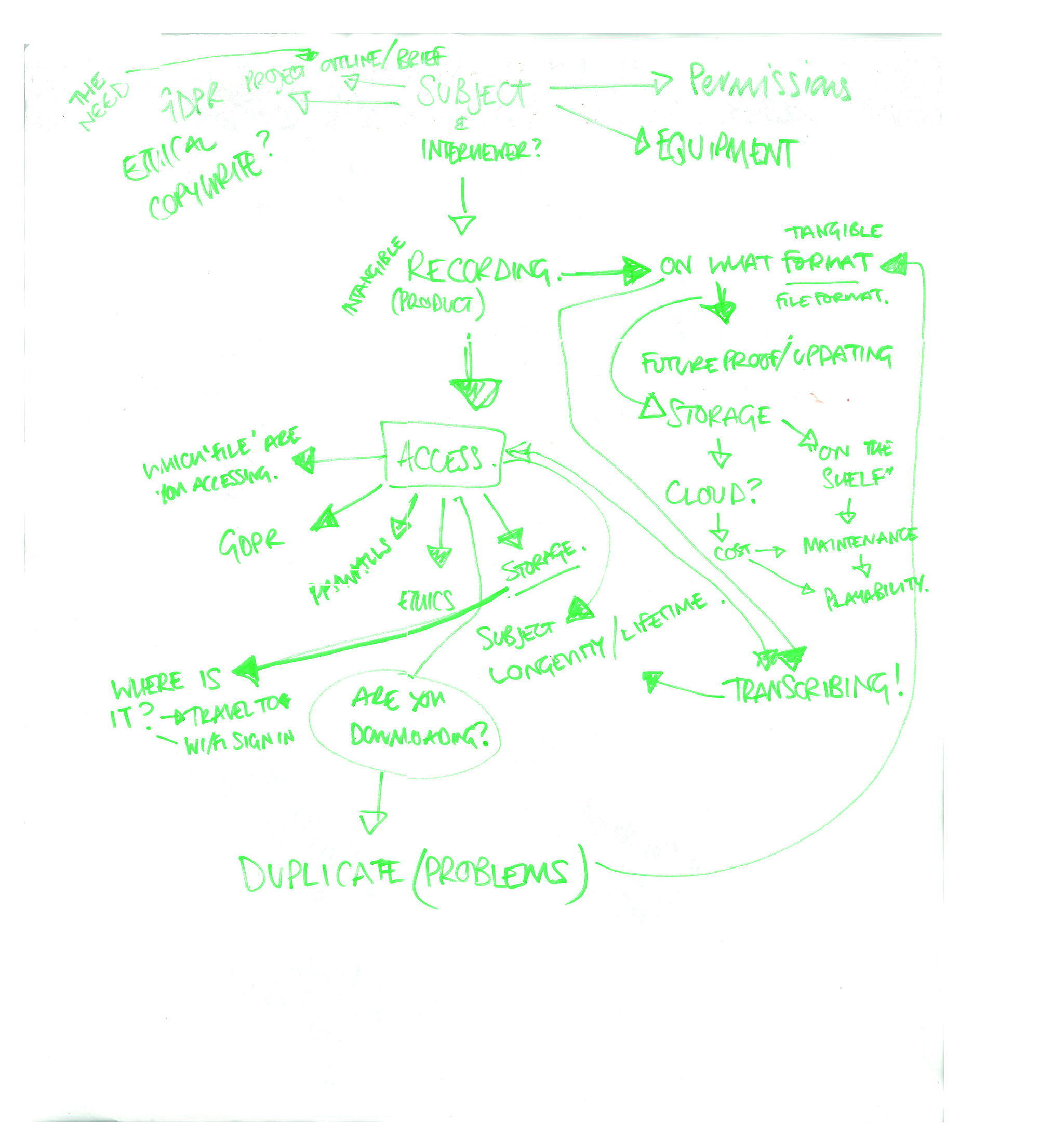
Activity Three: What are we going to make?
Aim: To come up with ideas for the use of oral history by drawing on the two previous activities
Task: The participants are asked to come up with ideas that best display the value of oral history but also consider the resources, labour and ethics that are involved with handling an oral history.
Activity three was never completed.
NT Oral History Workshop – OHD_WKS_0208
nt. 004 Where the Trust’s inconsistent relationship with oral history is most evident, is within the Trust’s sound collection. This collection includes all the Trust’s oral histories, and is housed at the British Library. During the summer of my first year, I put every entry in the National Trust sound collection from the British Library’s catalogue into a spreadsheet.5 It revealed the many different oral history projects that had taken place, the varying scopes of these projects, and the differing levels of organisation, the latter of which was reflected in the various indexing styles.
nt. 005 I conducted a more thorough audit of the Trust’s collection, as well as listened to some of the recordings during my placement at the British Library in the late spring of 2023. I audited the uncatalogued material and went through the entire collection to see which recordings had the correct up to date copyright permissions.6
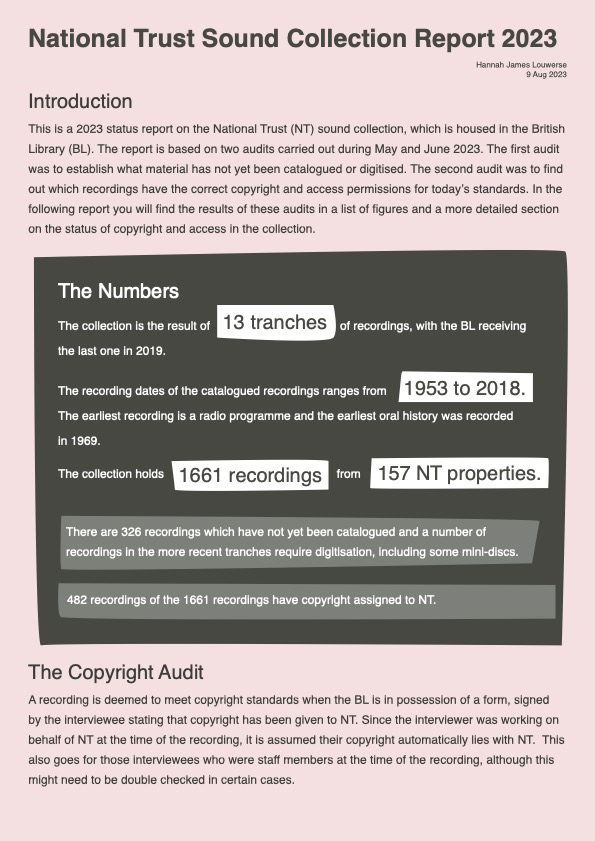
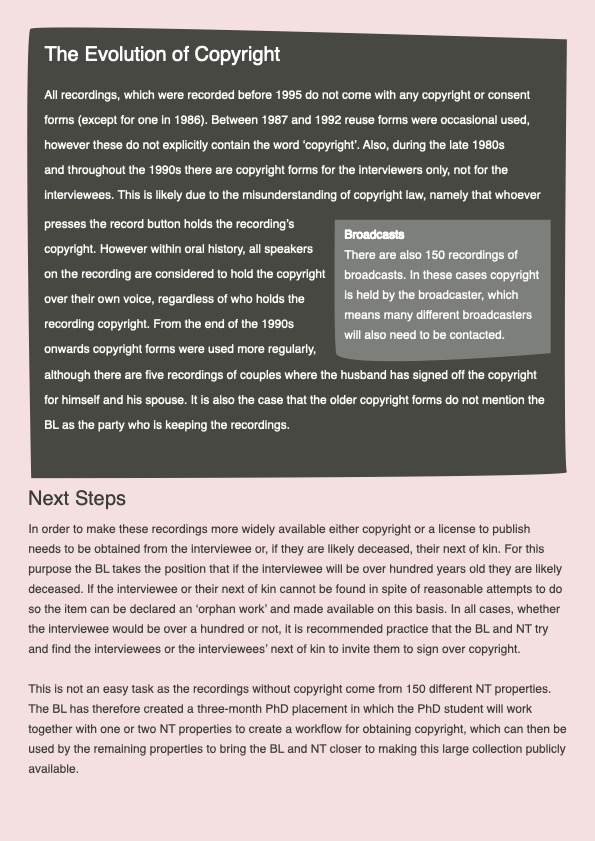
NT BL Report – OHD_RPT_0274
nt. 006 My work at the British Library led to the creation of a three month postgraduate placement.7 This placement was a pilot project which included collaborating with the staff at a specified Trust site. The aim was to develop a workflow that would help the staff at other sites obtain the required copyright for recordings or, otherwise, allow the recordings to be registered as orphan works. As I was the person who was the most familiar with the collection, having gone through it every entry several times, I was tasked with finding sites that would be a good fit for this collaborative pilot.
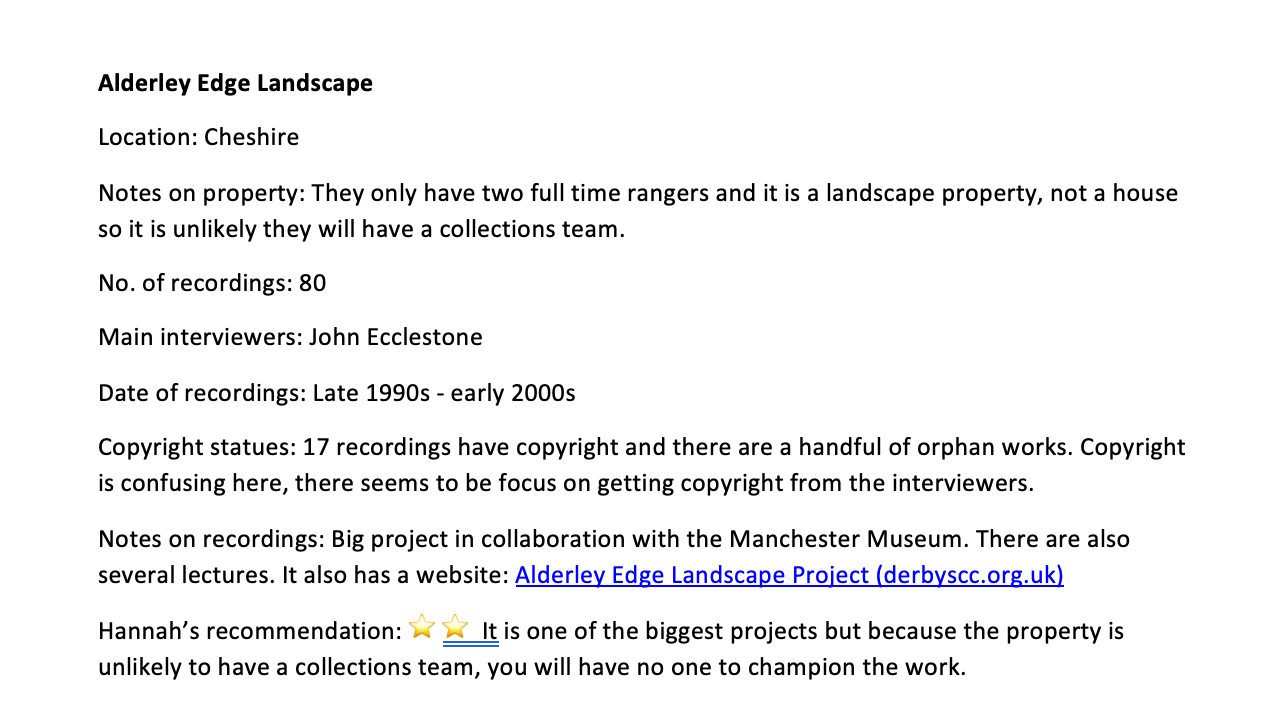
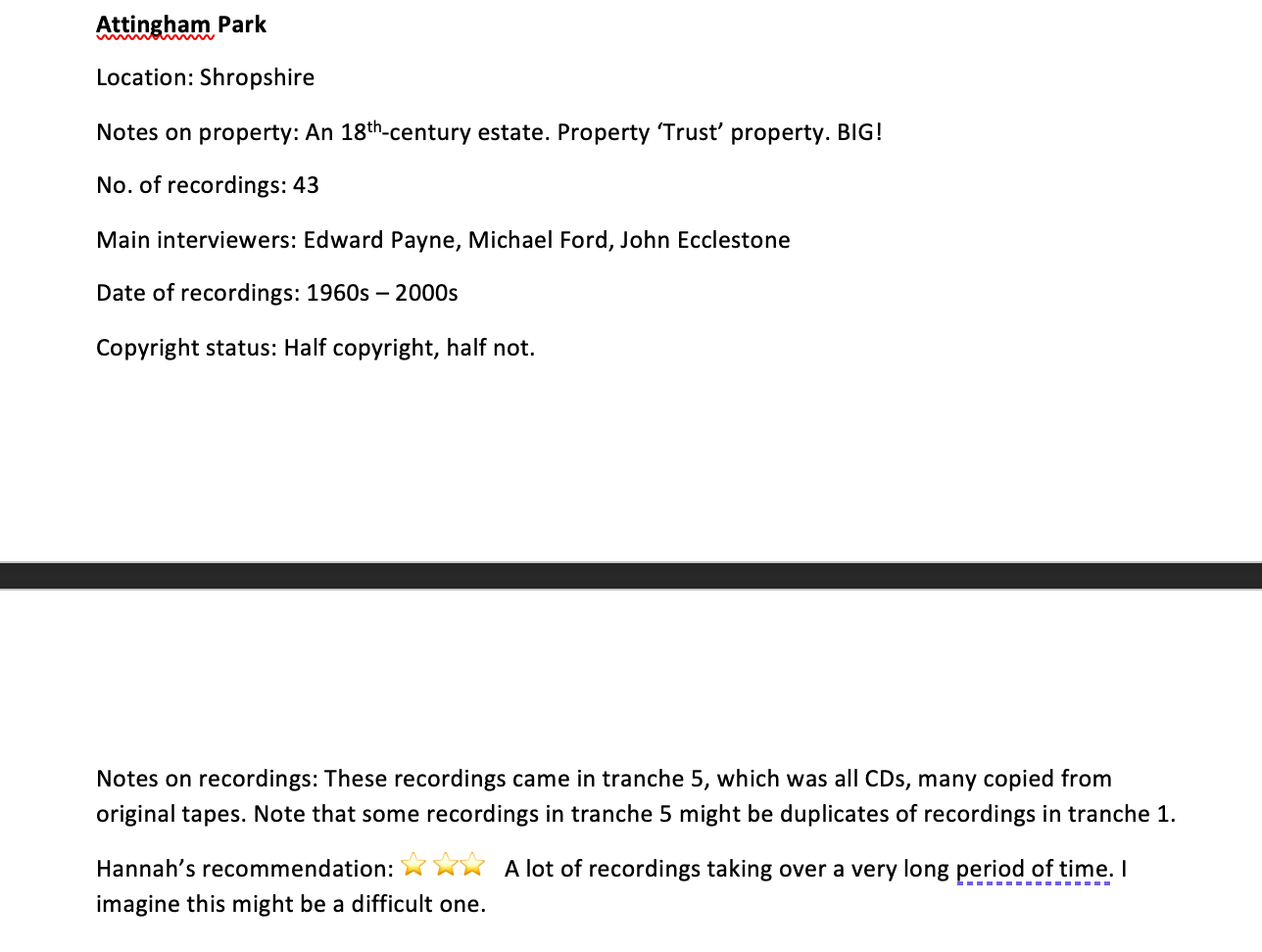
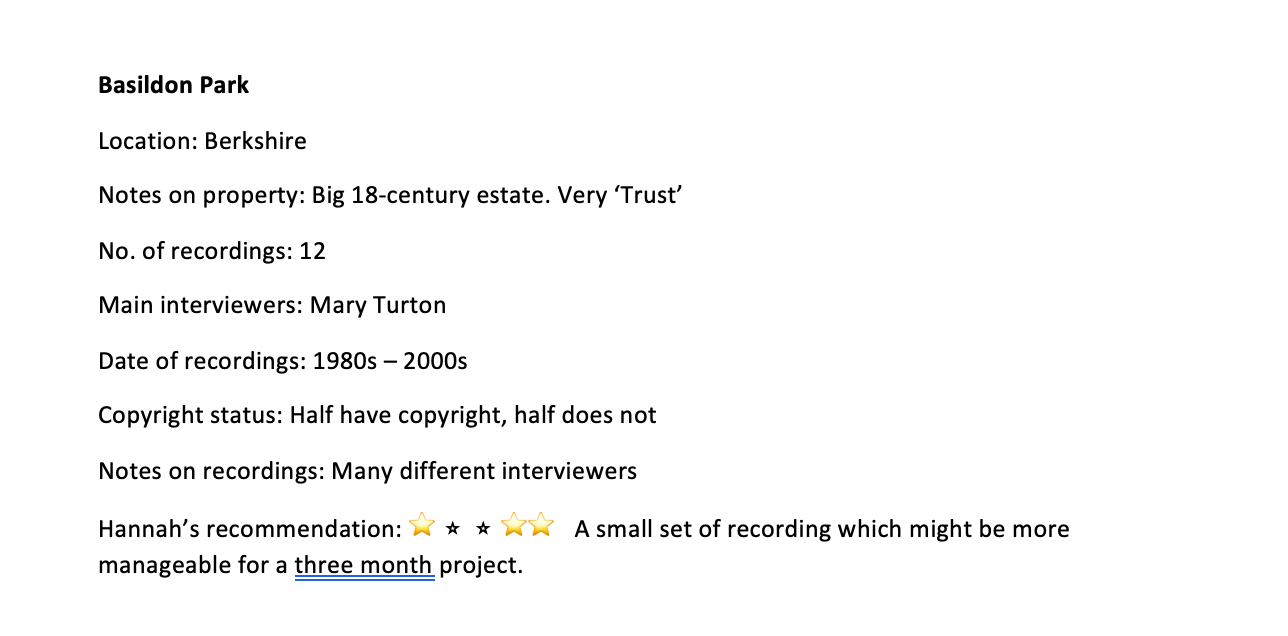
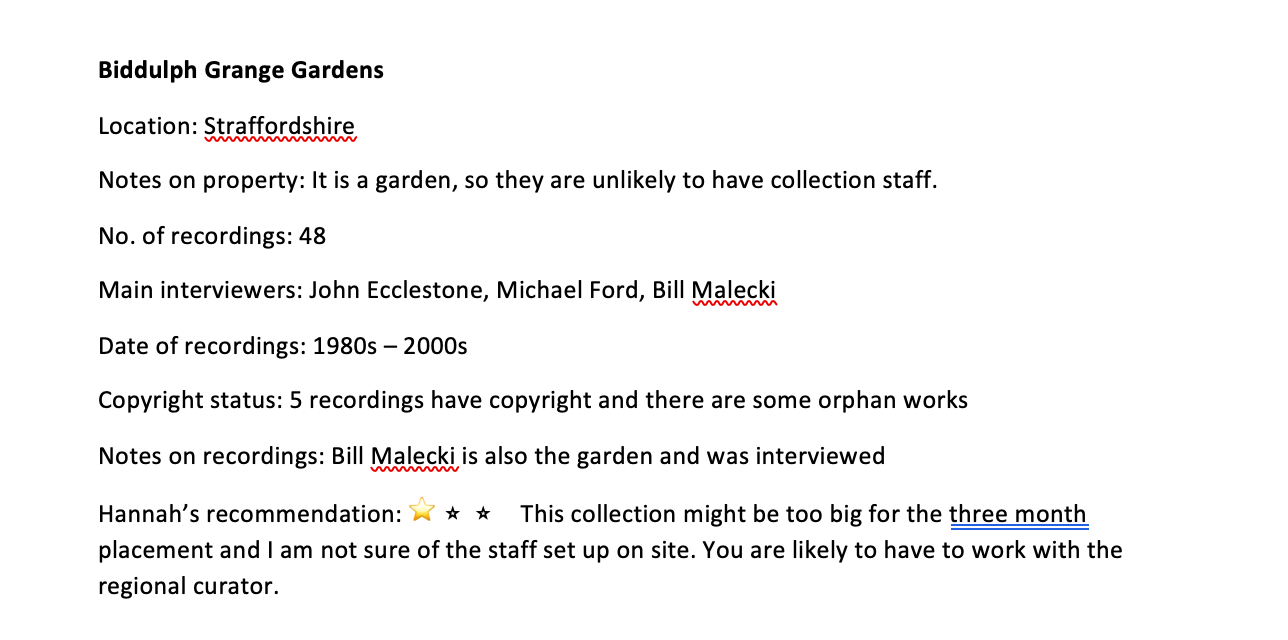
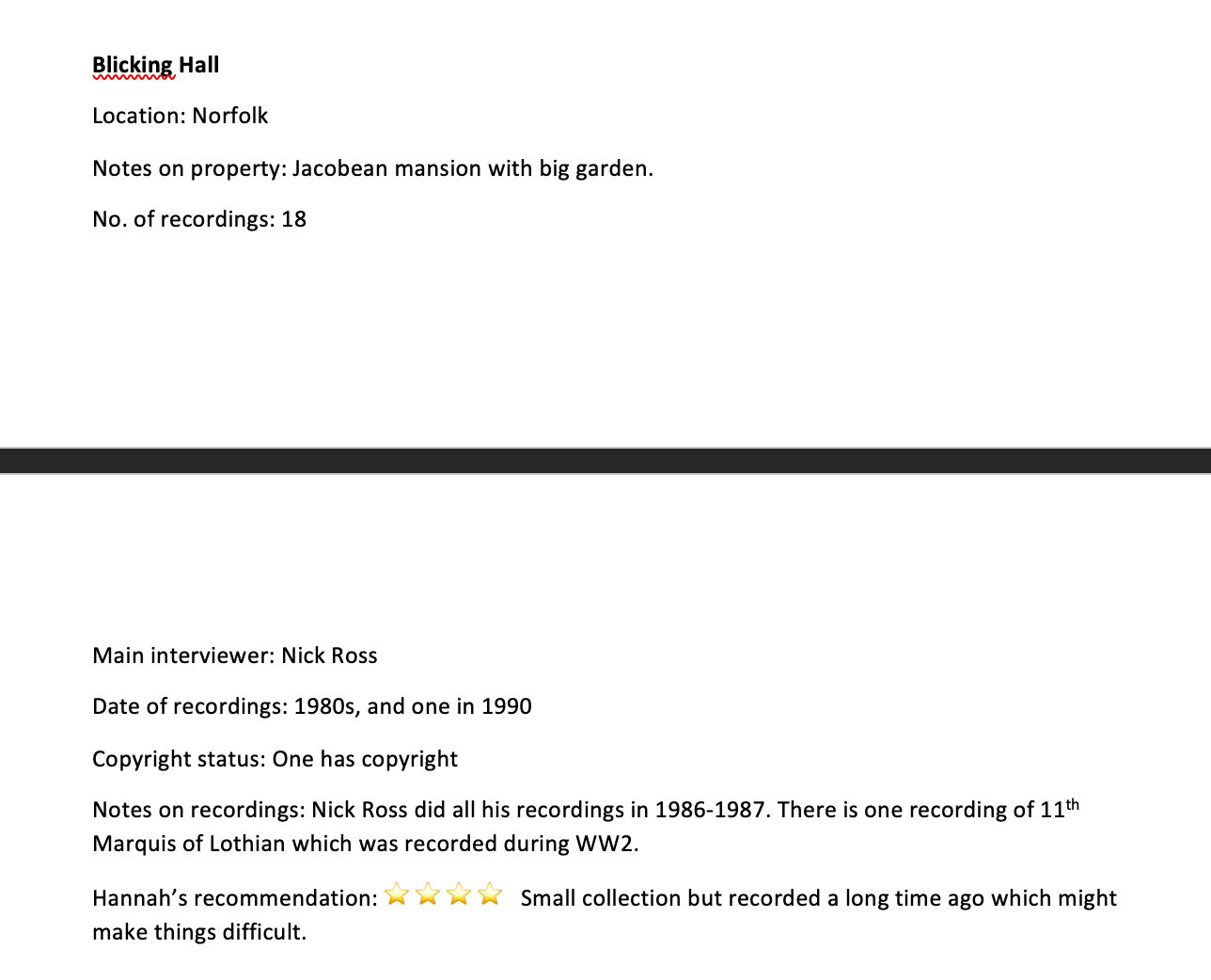
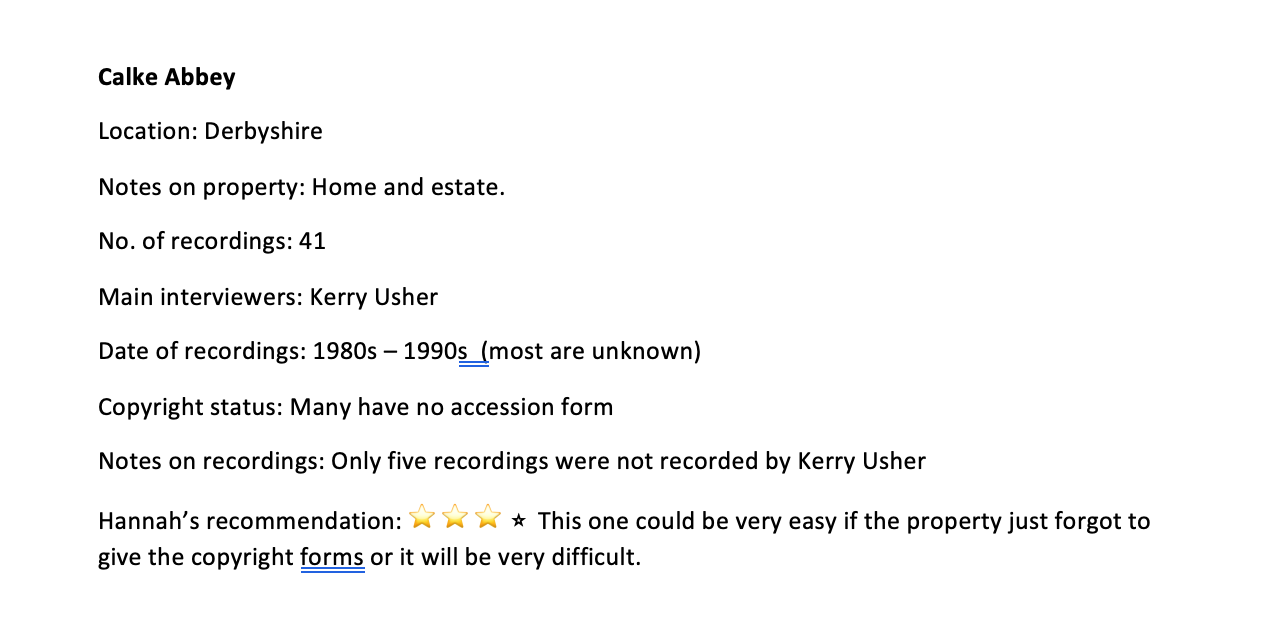
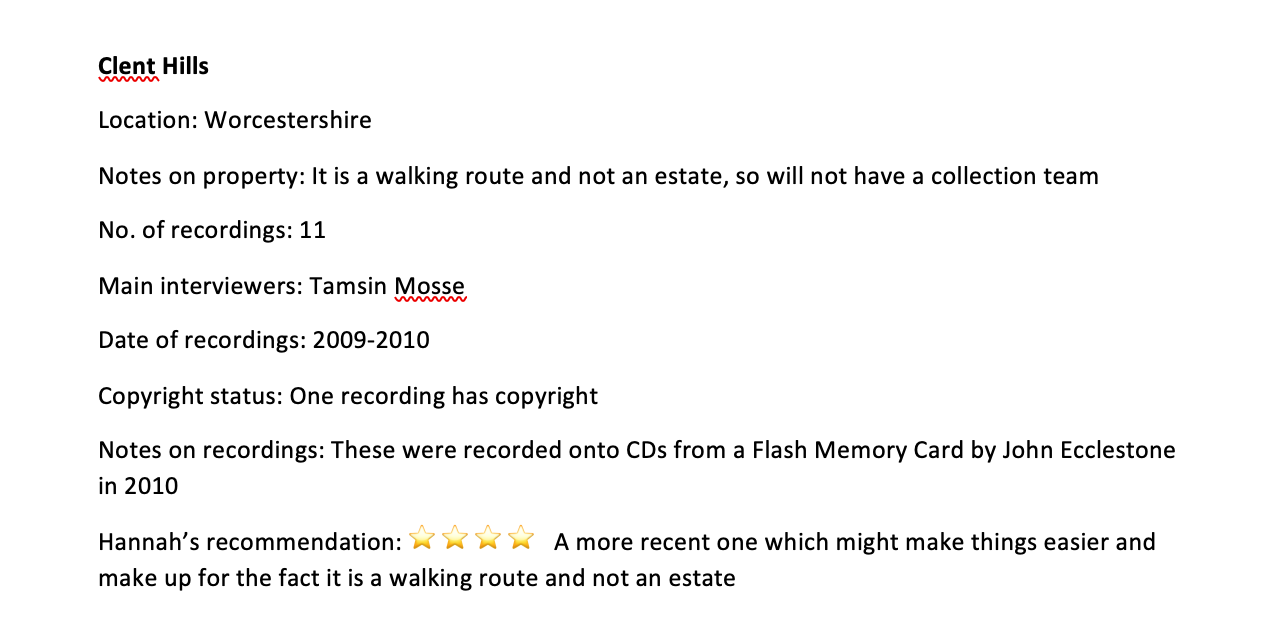
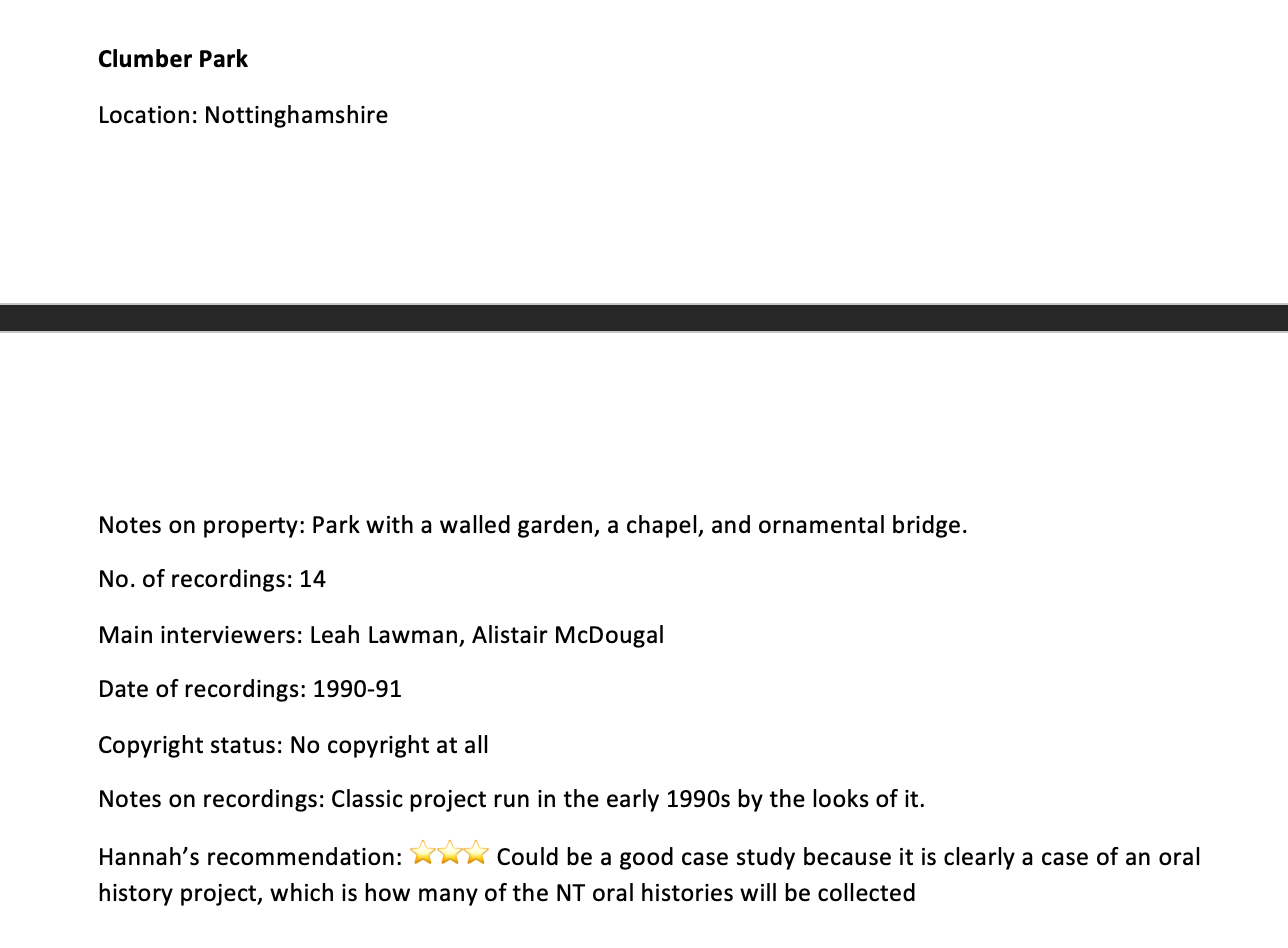
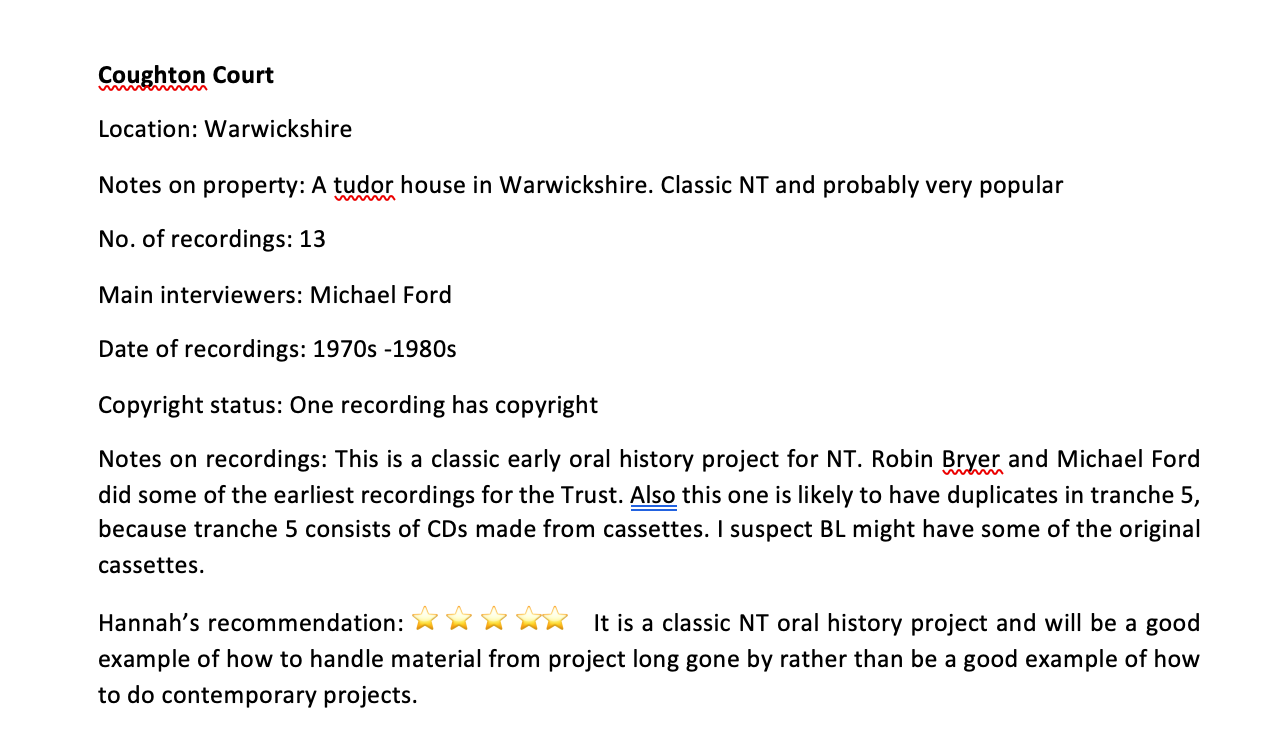
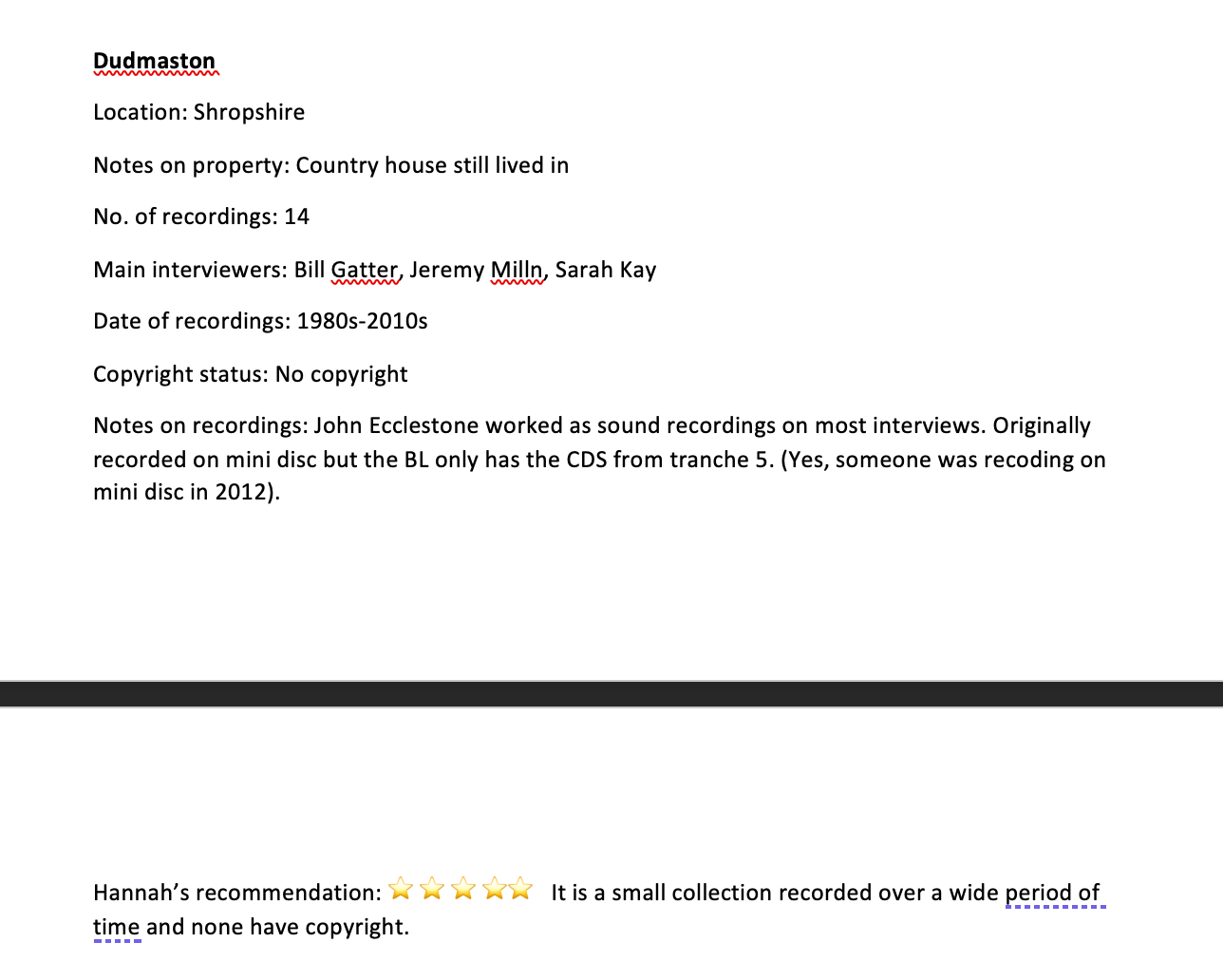
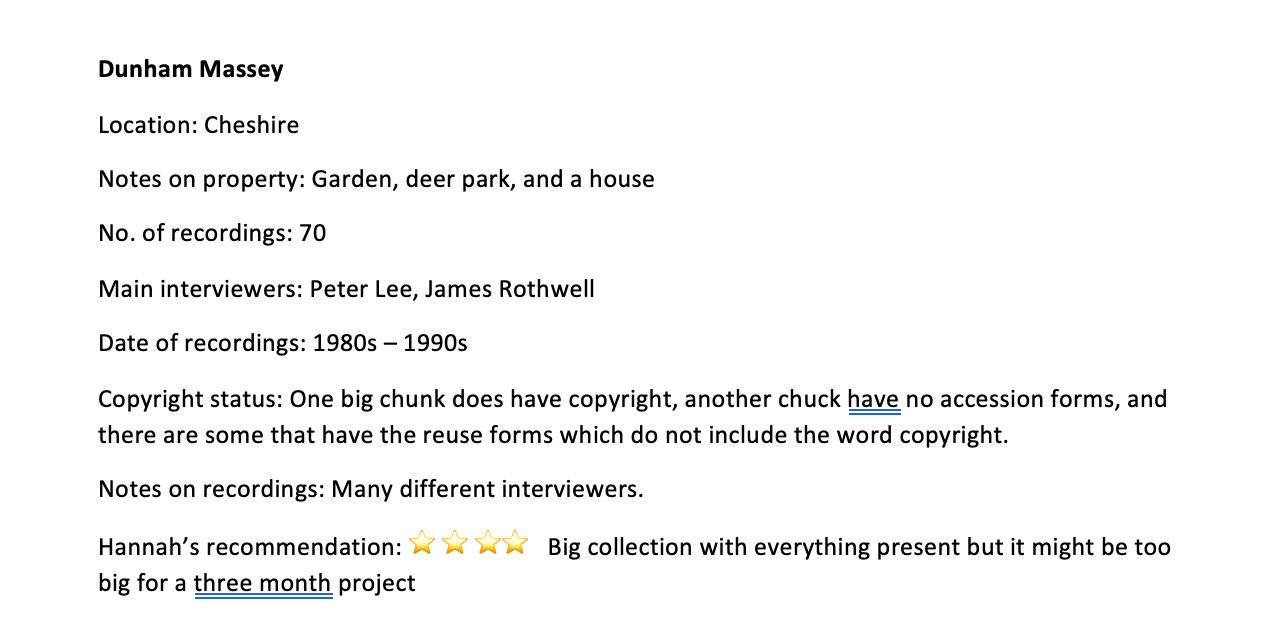
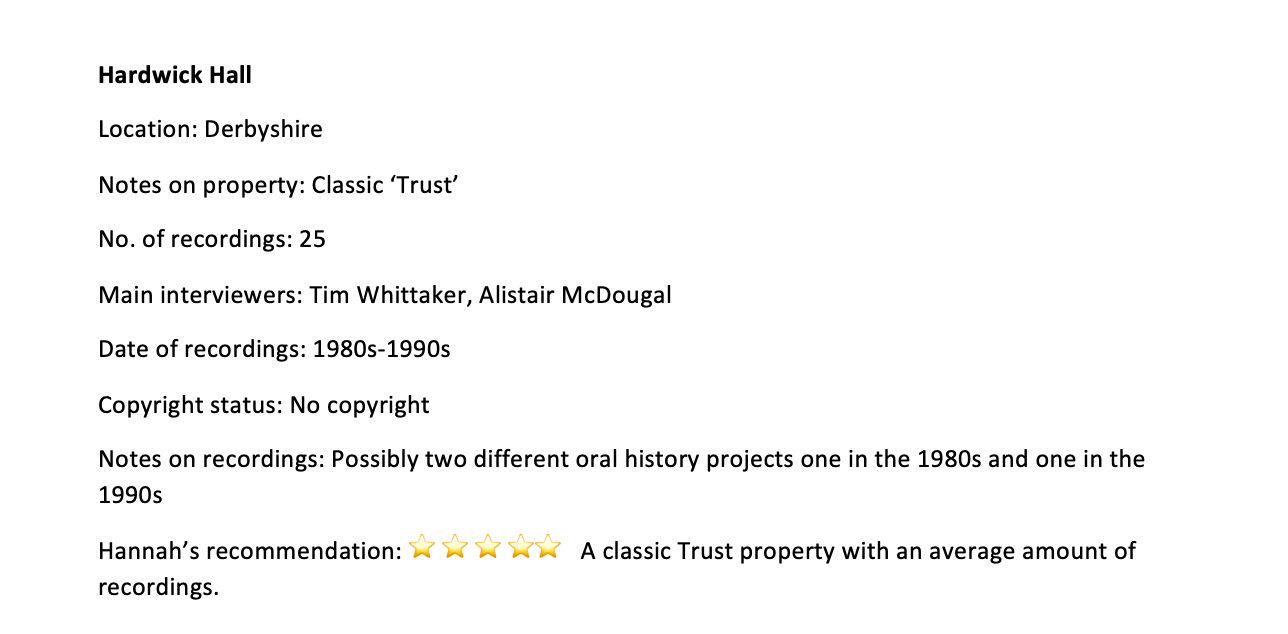
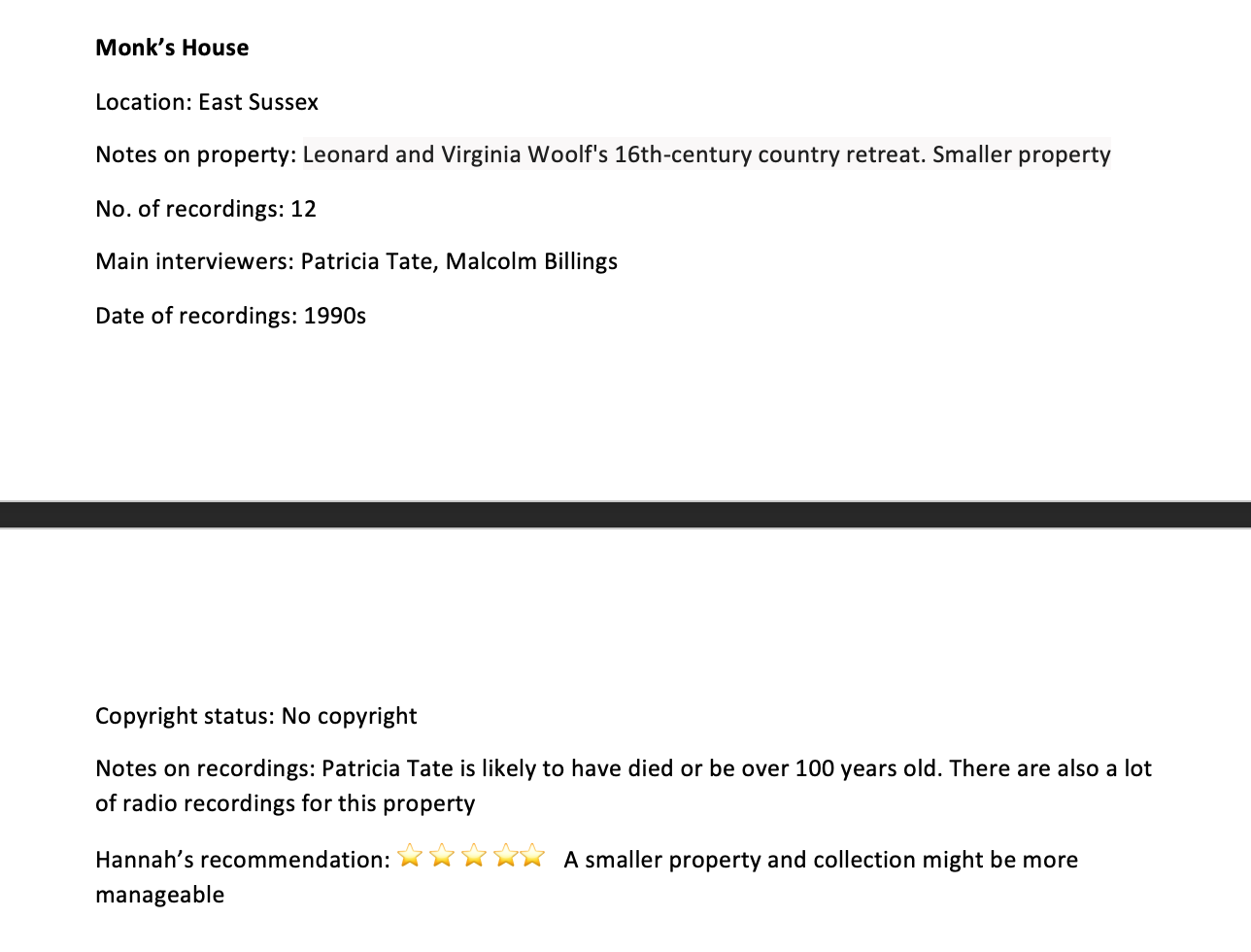
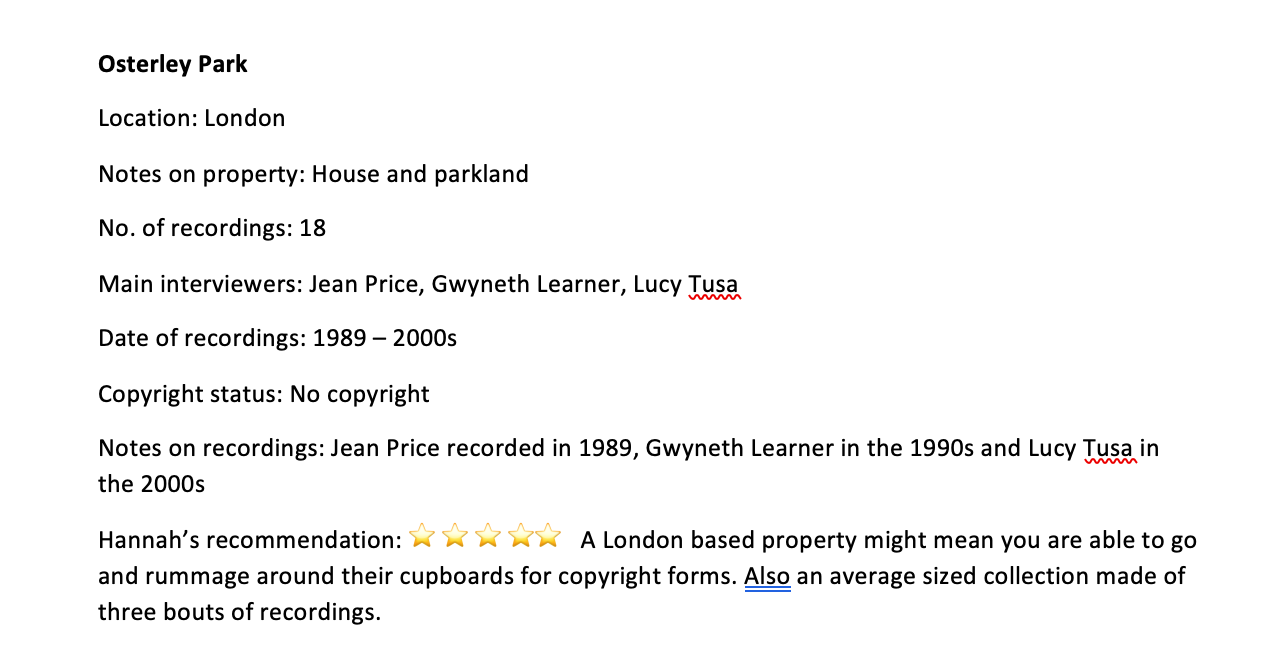
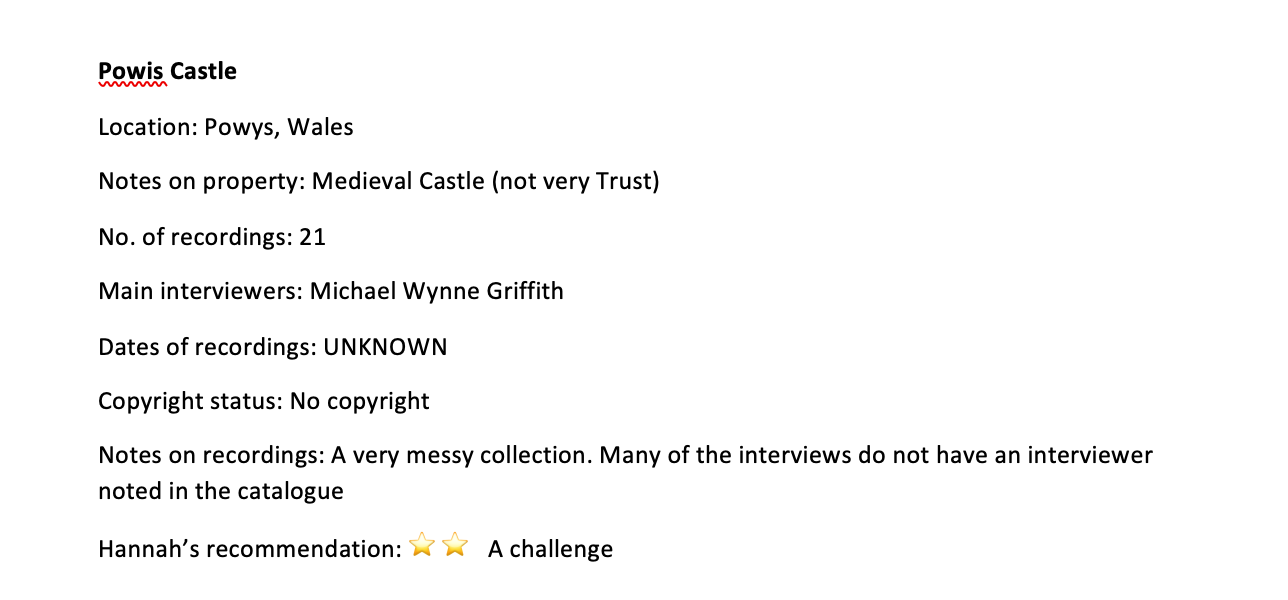
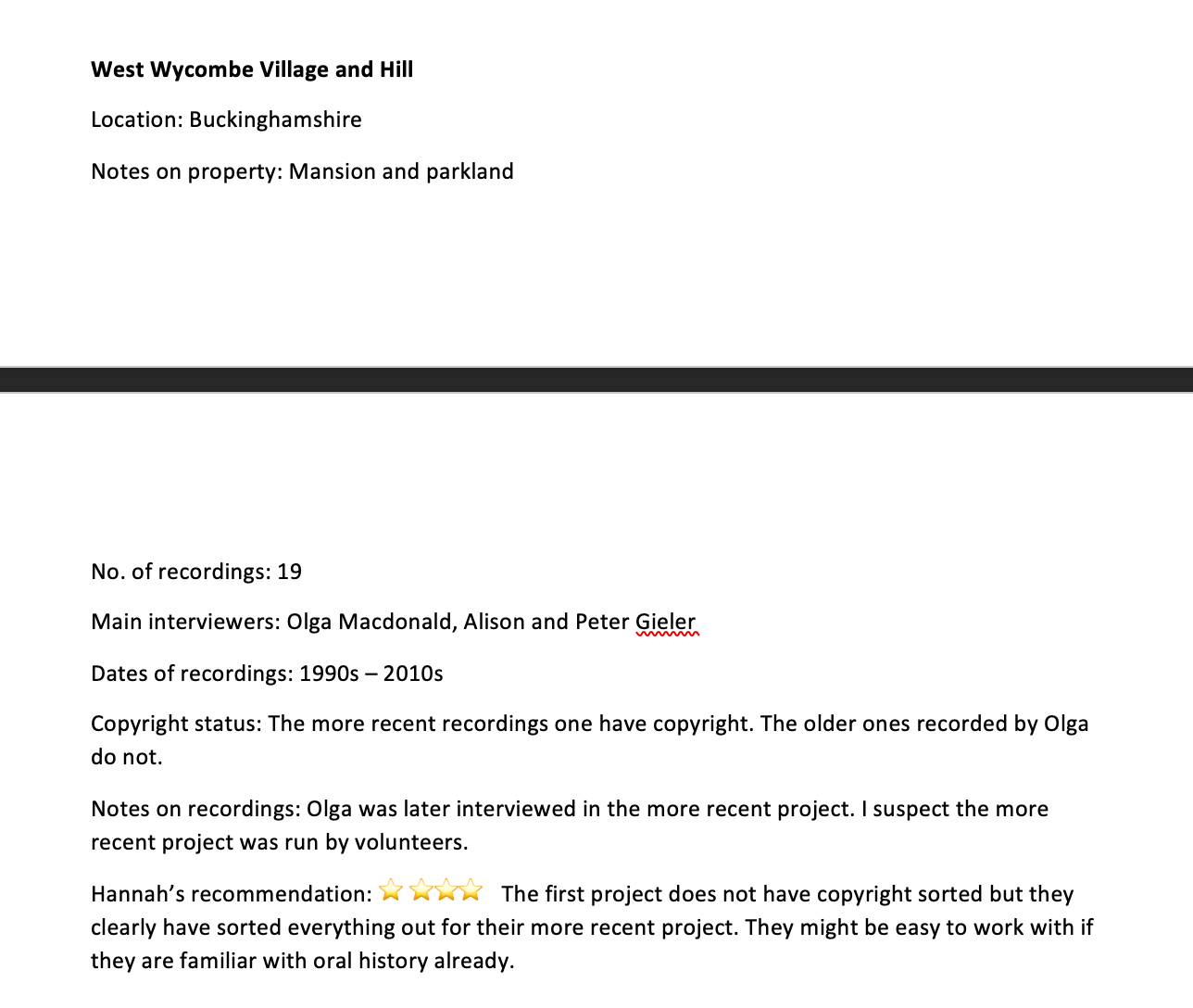
NT property recommendations for PhD placement – OHD_RPT_0263
o… The National Trust is not an archive. Every recording is stored at the British Library and you have to pay to get it out; a small fee but still. A fabulous perk of having it stored at the British Library is that the library is a powerhouse and has the money and facilities to keep everything updated and playable. They also have great paperwork, which can be interpreted in multiple ways. The National Trust also does not use this archive. The National Trust podcasters have only recently discovered the existence of the archive, which is a bit awkward.
OHD_BLG_0063 A meeting with Lucy 22/04/21
nt. 007 This audit and the subsequent internship revealed how there was no consistent approach to oral history across the Trust, and how little energy is given to maintain access to these recordings once archived, which renders certain project outputs unusable. This is not a surprising outcome, as responsibility for maintaining this oral history collection is not explicitly clear. The Trust handed over their collection but arguably in an incomplete form given the missing copyright, which could realistically only be obtained by Trust staff and volunteers, since they are the ones closest to the communities from which the recordings were taken. There is also an assumption that the Library has the capacity to look after all these recordings.8 An assumption that might be incorrect, considering the Library was hacked in October 2023 and the Sound and Moving Image Archive has still not returned online, at the time of writing.9 Even before the cyber attack there was no public access to the Trust’s sound collection, hence the title of my initial report – Play this (at British Library only).10
nt. 008 The disjointedness illustrated above is part the result of the Trust not including oral history in its collection policy. While I was doing my placement at Seaton Delaval Hall, I was able to witness the acquisition of an architectural drawing of the mausoleum with its original roof, before it was stolen. My National Trust supervisor showed me the Trust’s Collection Management System (CMS), the acquisition forms, and the Trust’s collection policy. None of these accommodate the acquisition of intangible or digital heritage, which includes oral history. The policy only discusses ‘objects’ and only material objects are allowed to be entered into CMS, under either the collection or the objects which have a functioning role on the site, such as chairs for the room guides to sit on.11 The acquisition forms are primarily focussed on the monetary value of acquired objects.
nt. 009 The Trust is in an odd situation as it simultaneously has one of the largest oral history collections in the country while lacking a dedicated policy for its collection. I saw this as an opportunity, because after completing my placement at the British Library I probably was one of the most, if not the most, familiar with the collection, meaning I was best positioned to explain the value of oral history to the Trust. I wrote about this in a blog post for the British Library, which sadly was never published because of the cyber attack in October 2023.12 And I also presented a poster at the National Trust Postgraduate Research Day 12th June 2023.13
The National Trust is one of the biggest landowners and charities in the UK; the number of stories and histories which come under its care are innumerable. And these are exciting and often fundamentally conflicting stories: there is no single story of the National Trust. Recounting the history and significance of the Trust is always a balancing act in which the many layers of history kept by and embodied in the estates needs to be told from different perspectives. A conflict of interest and a struggle for prominence is present in the current collection, but certain questions that are in the public eye today are notably absent. Nobody asks where the money came from, for example. The colonial pasts of these properties appear absent although it would be an interesting research project to comb the archived recordings for references to colonial ties.
OHD_WRT_0273 The Trust: stories of the nation
Oral History at the National Trust Poster – OHD_GRP_0260
nt. 010 I brought all of my ideas, knowledge, and experience in a three-hour online workshop about oral history at the National Trust. The workshop was in three sections: past, present and future, and was open to the Trust staff and volunteers. As with my earlier interactions with Trust staff and volunteers, there were varying levels of familiarity with oral history accompanied by enthusiasm for oral history as a method and source, as was evident in the questionnaires I sent out prior to the workshop.14 There was some anxiety around data protection and oral histories, with some participants worrying that the effort to record and manage oral histories ethically may not be worth the stress and time. The workshop was an opportunity to present my findings and ideas to my stakeholders one more time before creating my final research outputs.


Pie charts from the Oral History at the National Trust Pre-Workshop questionnaire – OHD_FRM_0326
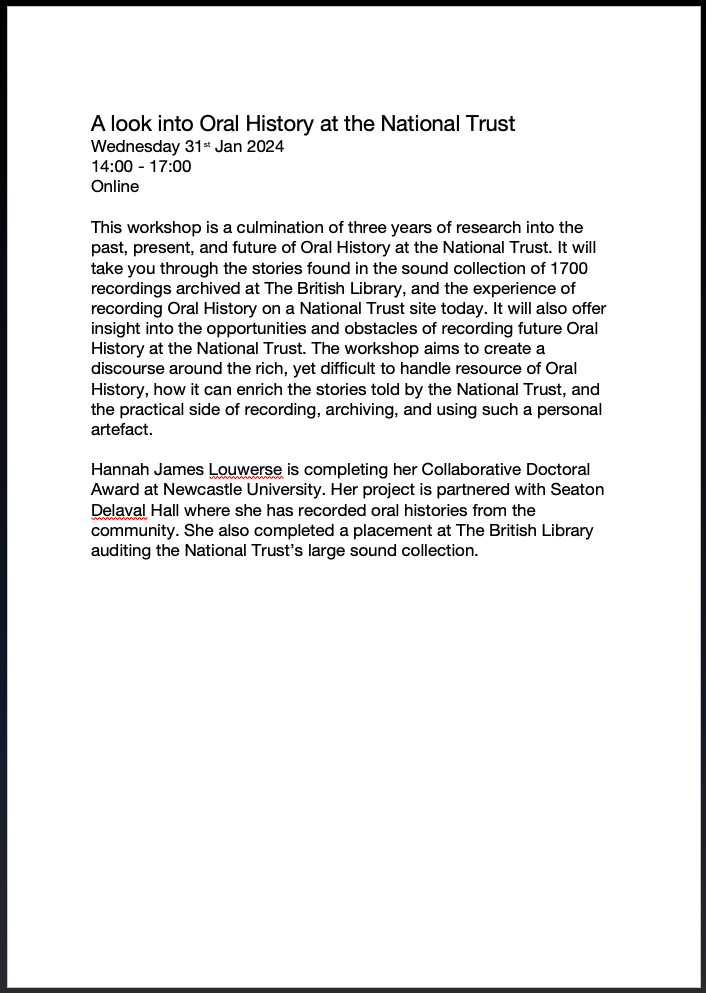
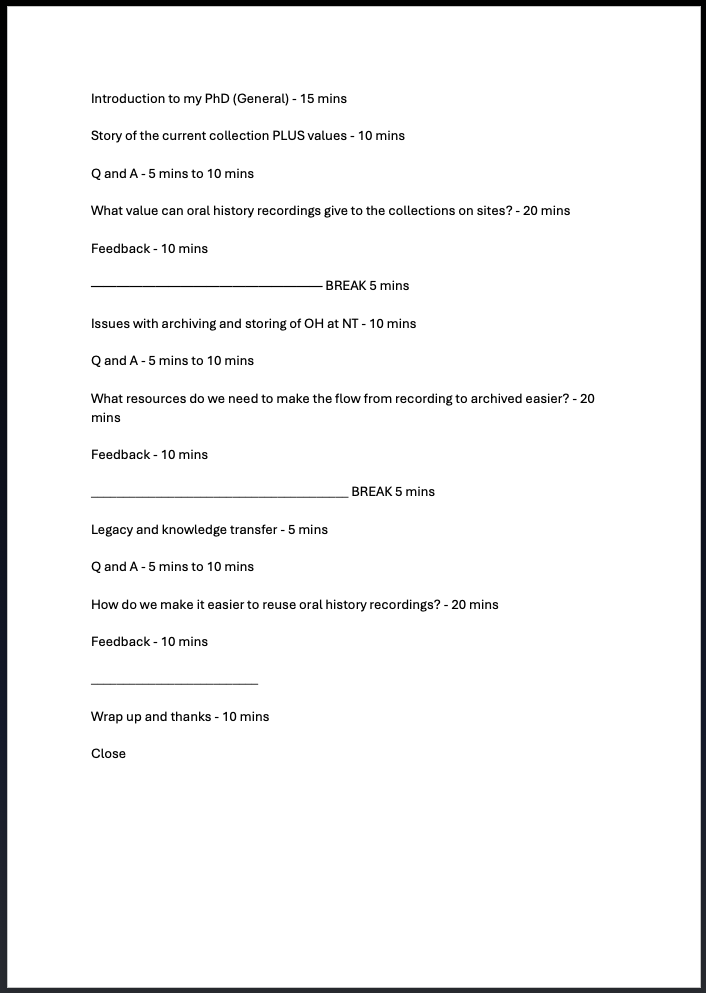
Blurb and plan for final NT workshop – OHD_COL_0279
nt. 011 After the workshop I developed my final two outputs: the status report of oral history at the National Trust15 and a new guide to oral history.16
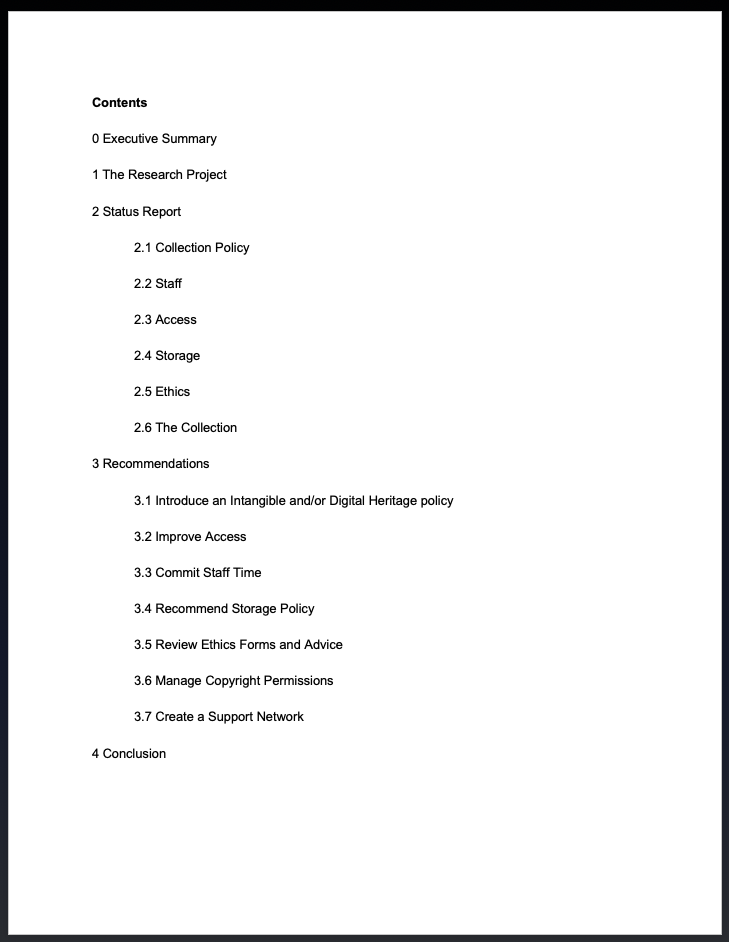
Contents page of OHD_RPT_0298
Chat GPT Summary of OHD_RPT_0298 - NT OH report
[generated 08 / 03 / 2025]
### **Summary of the Report: Oral History at the National Trust**
#### **Overview**
The report examines the status of oral history at the National Trust (NT), highlighting obstacles in collecting, archiving, and maintaining oral history recordings. It explores how NT policies impact oral history preservation and suggests improvements to foster a stronger oral history culture.
#### **Key Findings**
1. **Lack of Collection Policy** – NT primarily focuses on physical heritage, with no formal policy for intangible and digital heritage, including oral history.
2. **Limited Staff Commitment** – While some staff have oral history in their roles, site-level job descriptions do not include its management.
3. **Restricted Access** – NT lacks a standardized system for accessing archived oral histories. The British Library holds recordings, but access is hindered by issues like a 2023 cyberattack.
4. **Unclear Storage Guidelines** – No consistent guidance on technology for recording and managing oral history, leading to data protection and accessibility challenges.
5. **Outdated Ethics Policies** – NT’s ethics guidelines have not been updated since 2018 and do not align with best practices, particularly regarding copyright agreements and handling sensitive content.
6. **Copyright Issues** – Only 482 of the nearly 1,700 oral history recordings in NT’s British Library collection have proper copyright permissions.
#### **Recommendations**
1. **Introduce an Intangible/Digital Heritage Policy** – Integrate oral history into NT’s collection policy to ensure structured preservation and institutional memory.
2. **Improve Access** – Develop a centralized system to catalog and search oral history recordings.
3. **Commit Staff Time** – Assign oral history tasks to designated staff roles to create a sustainable strategy.
4. **Establish a Storage Policy** – Regularly update technology and data protection guidelines in collaboration with IT and data protection teams.
5. **Review Ethics Policies** – Update ethics guidelines regularly and provide sensitivity training for staff.
6. **Manage Copyright Permissions** – Create a step-by-step workflow to secure permissions and register orphaned works.
7. **Create a Support Network** – Establish an NT-wide oral history support network to facilitate knowledge sharing and discussions.
#### **Conclusion**
The NT has a valuable oral history collection, but systemic changes are needed to ensure its preservation and accessibility. By integrating oral history into its policies, NT can enhance its heritage conservation efforts.
nt. 012 Part of me wanted to resist creating a guide to oral history as I felt that, like the current Trust oral history guide, it would soon become out of date. This is why I briefly toyed with the idea of making something dubbed ‘the NOT how-to guide.’
In the end I made sure the advice given in my final guide was open and flexible. I emphasised the importance of networking and collaboration, and overall working towards a wider culture of oral history at the Trust.
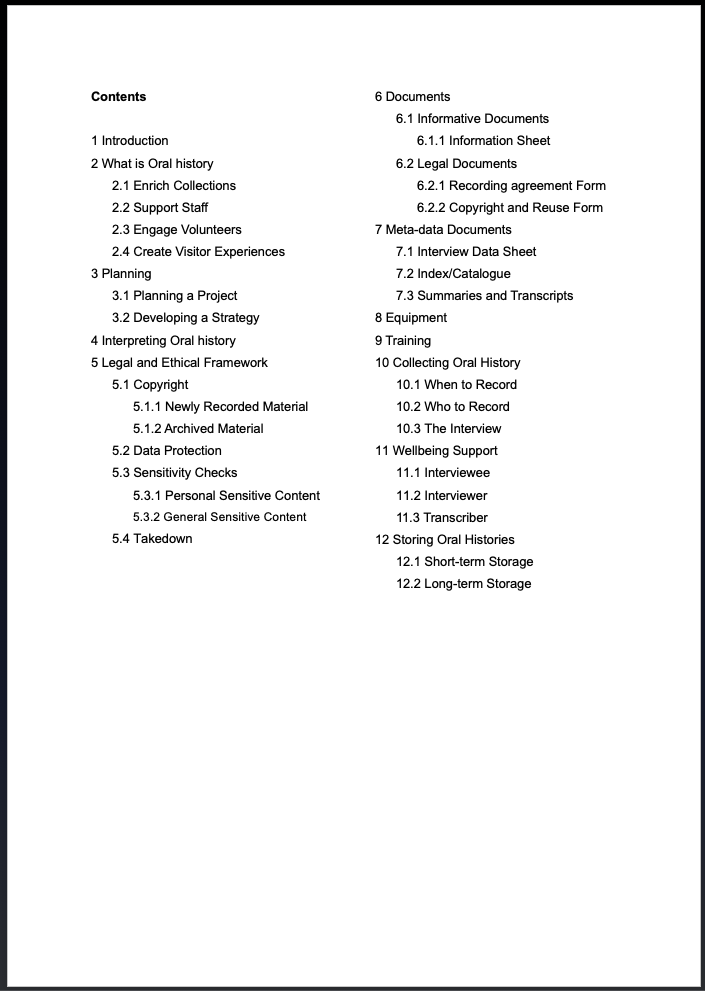
Contents page of OHD_DSN_0299
Chat GPT Summary of OHD_DSN_0299 - NT OH guide
[generated 08 / 03 / 2025]
### **Summary of the National Trust Oral History Guide**
#### **Purpose**
The guide provides best practices for collecting, managing, and preserving oral history at the National Trust (NT). It highlights the value of oral history in enriching collections, supporting staff, engaging volunteers, and enhancing visitor experiences.
#### **Key Sections**
1. **What is Oral History?**
- Oral history records personal stories, perspectives, and cultural knowledge through interviews.
- NT has nearly 1,700 recordings archived at the British Library.
2. **Planning & Strategy**
- A clear plan is essential for successful oral history projects.
- Strategies should align with NT’s broader heritage goals and integrate oral history into site management.
3. **Interpreting Oral History**
- Oral history is subjective and should be analyzed within its historical and social context.
4. **Legal & Ethical Considerations**
- **Copyright**: Interviewees own their recordings unless they sign over rights to NT.
- **Data Protection**: GDPR rules apply; sensitive content must be managed carefully.
- **Takedown Requests**: Individuals can request restricted access or removal.
5. **Documentation & Metadata**
- Key documents include **recording agreements**, **copyright forms**, and **interview data sheets** to ensure legal and archival integrity.
6. **Equipment & Training**
- Proper recording, file management, and storage equipment are required.
- Staff and volunteers need training in interviewing, data handling, and archiving.
7. **Conducting Interviews**
- Interviews should be **well-prepared**, **ethically conducted**, and **respectful of interviewees’ experiences**.
- Emotional support for both interviewers and interviewees is important.
8. **Storage & Archiving**
- **Short-term**: Secure storage to comply with data protection laws.
- **Long-term**: Archival deposit at the British Library ensures preservation and accessibility.
#### **Conclusion**
The guide emphasizes the importance of oral history in preserving diverse narratives. It provides a structured approach for NT staff and volunteers to responsibly collect, manage, and archive oral history recordings.
- I had actually already made a flowchart for Archives at NCBS. See James Louwerse, H., Feb 13, 2023, Miro board of the archiving workflow. OHD_Archive. OHD_WHB_0248. ↩︎
- Gillian Grigg, A guide to setting up a National Trust Oral History Project, ed. Oonagh Kennedy and Anne Gatward. ↩︎
- James Louwerse, H., Oct 27, 2022, NT oral history experience. OHD_Archive. OHD_WRT_0177. ↩︎
- James Louwerse, H., Oct 27, 2022, NT Oral History Workshop. OHD_Archive. OHD_WKS_0208. ↩︎
- James Louwerse, H., Jun 9, 2021, National Trust collection at British Library. OHD_Archive. OHD_SPS_0161. ↩︎
- James Louwerse, H., Jun 22, 2023, C1168 Audit 2023. OHD_Archive. OHD_COL_0262; James Louwerse, H., May 23, 2023, C1168 uncatalogued items. OHD_Archive. OHD_WRT_0276. ↩︎
- James Louwerse, H., Jun 21, 2023, NT property recommendations for PhD placement. OHD_Archive. OHD_RPT_0263. ↩︎
- James Louwerse, H., Apr 22, 2021, A Spanner, a Chat and a Gang. OHD_Archive. OHD_BLG_0063. ↩︎
- Dead link at time of writing: https://sounds.bl.uk/. See also: ‘National Life Stories (NLS),’ British Library, n.d., accessed Mar 12, 2025, https://www.bl.uk/nls/; James Louwerse, H., Dec 4, 2023, British Library down. OHD_Archive. OHD_SSH_0313. ↩︎
- James Louwerse, H., Aug, 2021, Play this (at the British Library only). OHD_Archive. OHD_RPT_0132. ↩︎
- National Trust, National Collections Development Policy 2019-2024, 2019, 6. ↩︎
- James Louwerse, H., Sep 5, 2023, The Trust: stories of a nation. OHD_Archive. OHD_WRT_0273. ↩︎
- James Louwerse, H., May 25, 2023, Oral history at the National Trust Poster. OHD_Archive. OHD_GRP_0260. ↩︎
- James Louwerse, H., Jan 22, 2024, Oral History at the National Trust – Pre Workshop. OHD_Archive. OHD_FRM_0326 ↩︎
- James Louwerse, H., Aug 16, 2024, NT OH report. OHD_Archive. OHD_RPT_0298. ↩︎
- James Louwerse, H., Aug 16, 2024, NT OH guide. OHD_Archive. OHD_DSN_0299. ↩︎
